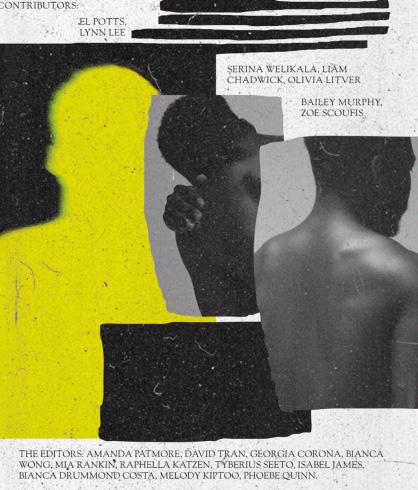




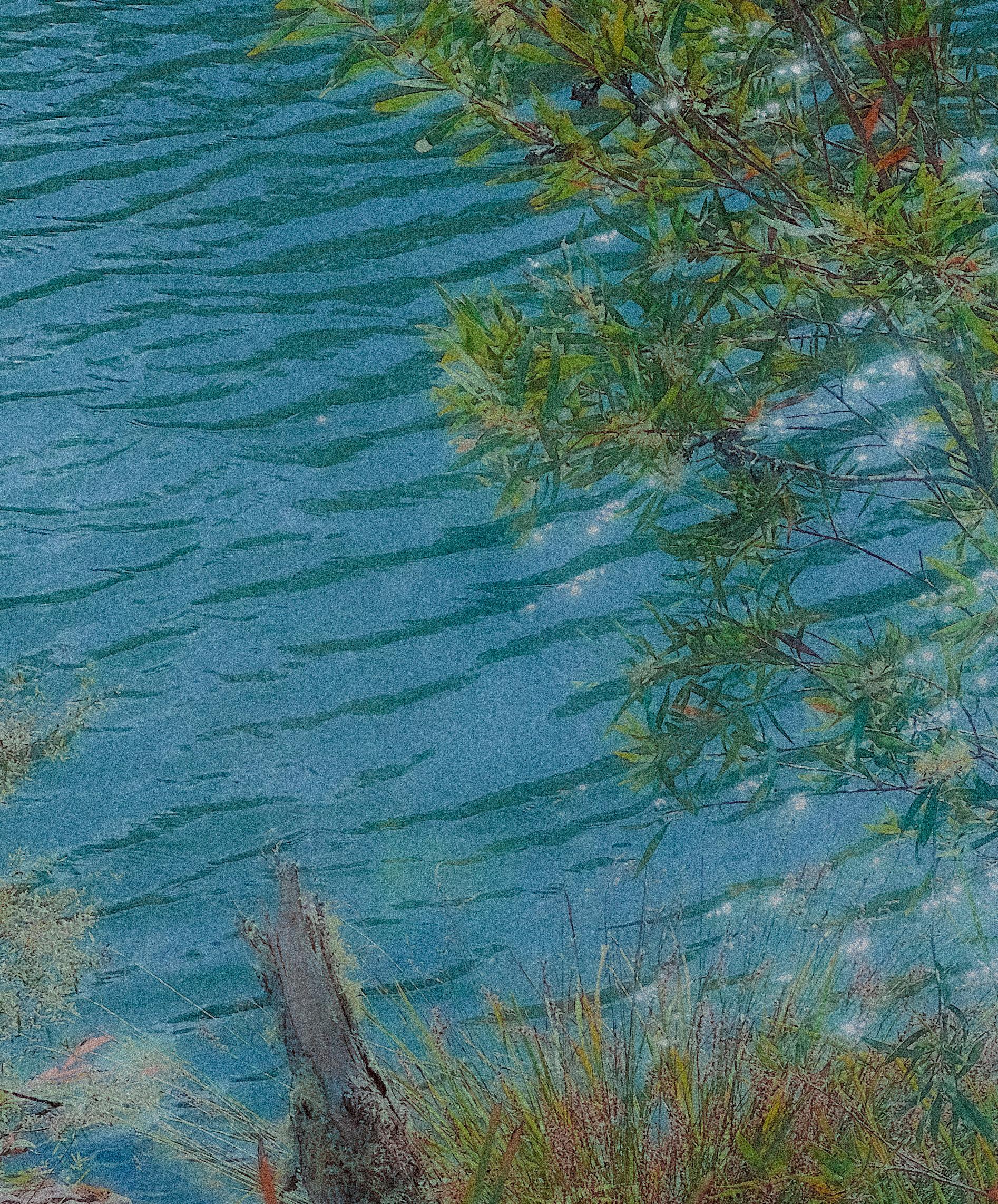
Vertigo acknowledges the Gadigal people on whose lands this magazine is published.
Our team works from the stolen land of the Gadigal and Darug peoples.
We pay our deepest respects to elders past, present and future and would like to extend our respect to all Aboriginal and Torres Strait Islanders people who read this magazine.
As we continue to create stories, we cannot go about it without recognising the importance of Dreamtime Stories which have echoed through these unceded lands for tens and thousands of years, stories which have held knowledge and wisdom for generations.
We also recognise that an acknowledgment is not enough. We continue to call for Indigenous justice, an end to Indigenous deaths in custody, and land back: the return of stolen land from the hands of the colonial forces to their rightful custodians.

Sovereignty was never ceded and this Always Was Always Will Be Aboriginal Land.




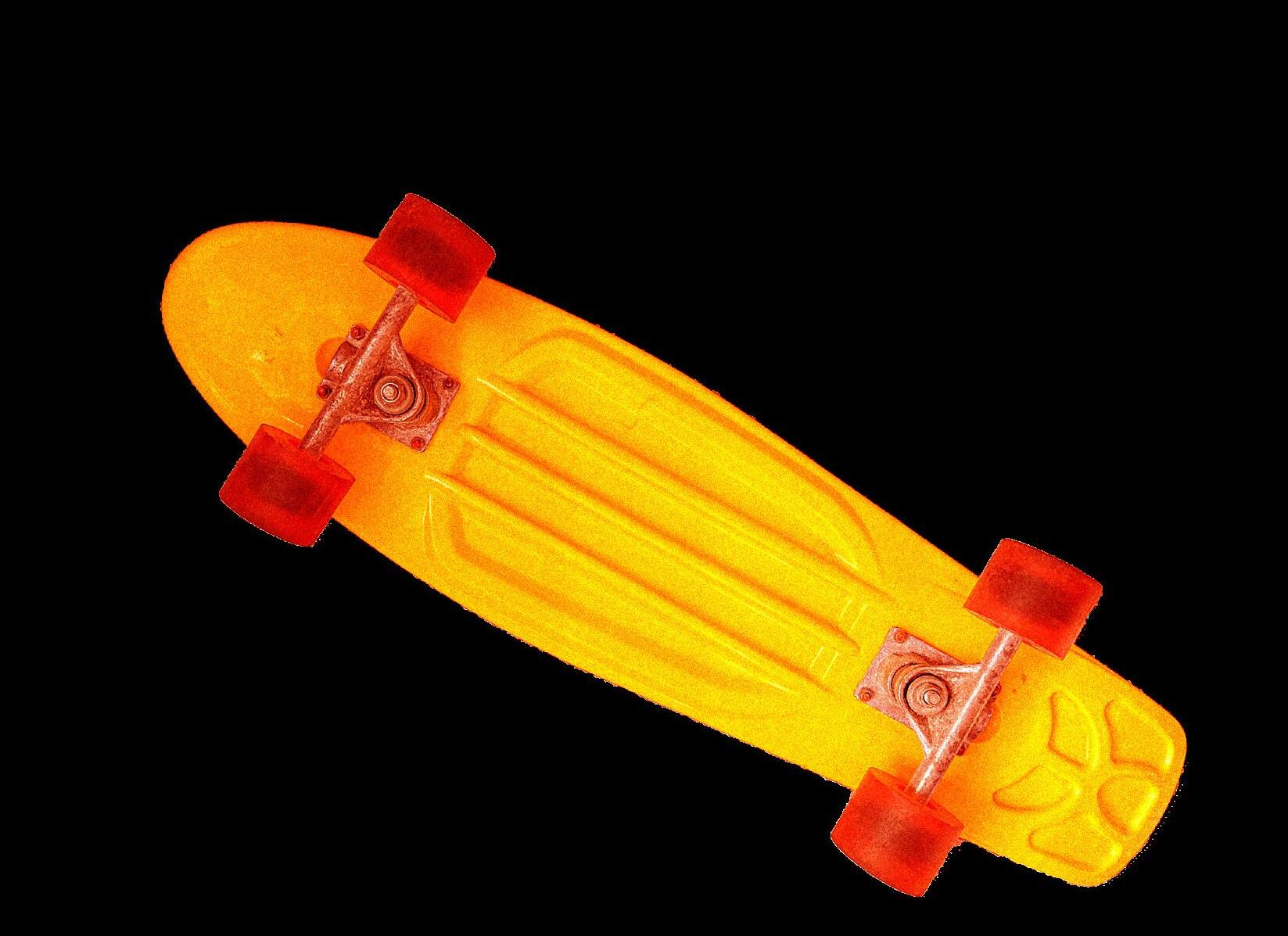











BELLE Creative Writing Editor WHAT IS YOUR
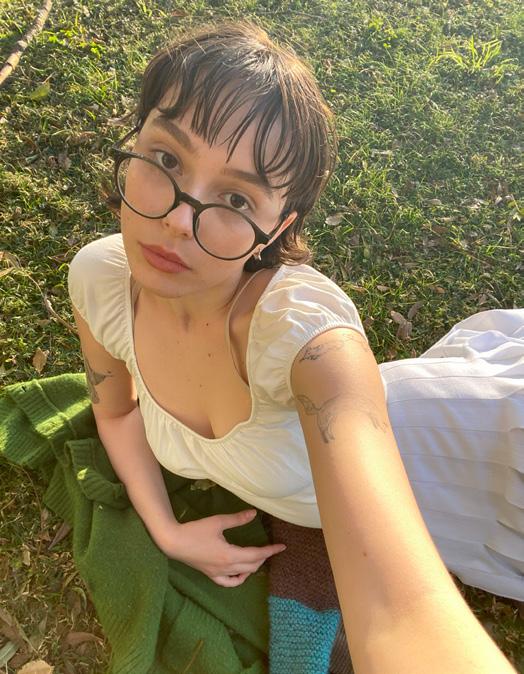
To see Frank Ocean live :(
MELODY
Society + Culture Editor

To own a spaceship
DAVID Designer

TYBERIUS Editor in Chief
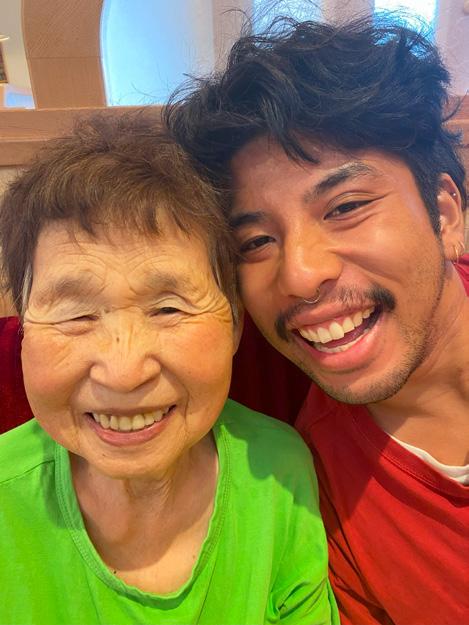
An end to bureaucracy in our student unions and complete editorial independence for student publications

To go on a neverending adventure
BEE Art Director
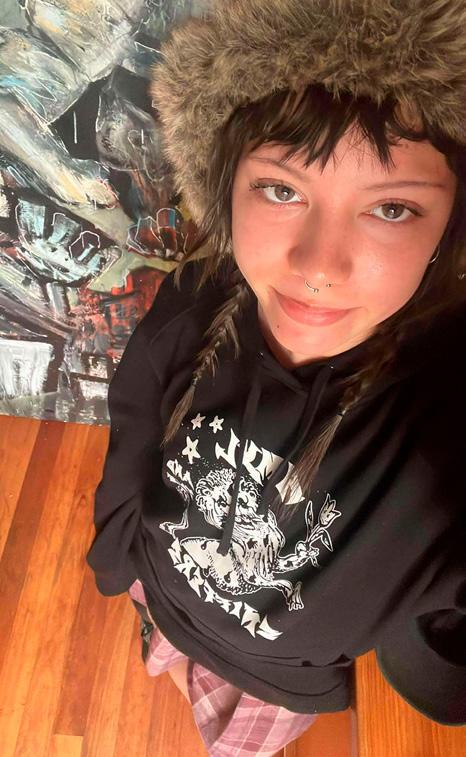
To steal the moon
GEORGE Designer
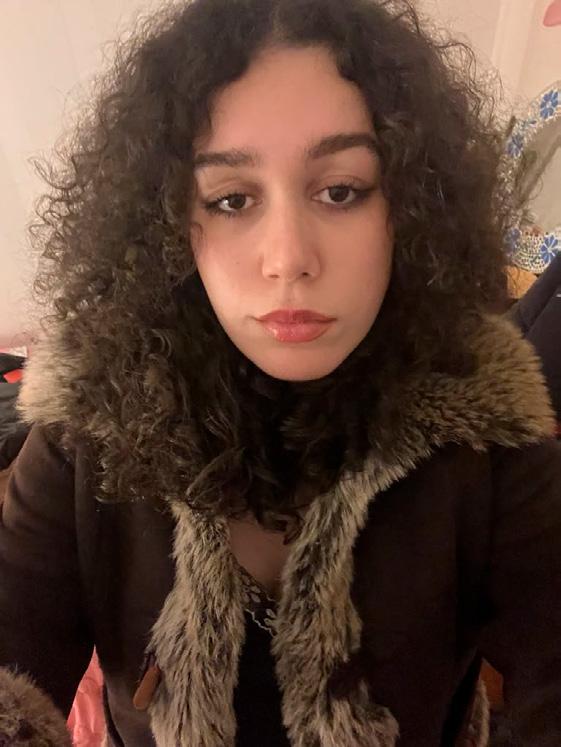
New music from D’Angelo


To adopt a black labrador and name it Murphy
RAPHAELLA Managing Editor MIA Arts + Lifestyle Editor

Soda water on tap in my house

To be on Broadway (I can’t sing)
AMANDA Designer PHOEBE Student News Editor BIANCA Student News Editor

To own a left-handed Rickenbacker 360/12 and/or wizard

To wake up one day and miraculously be taller than my mum
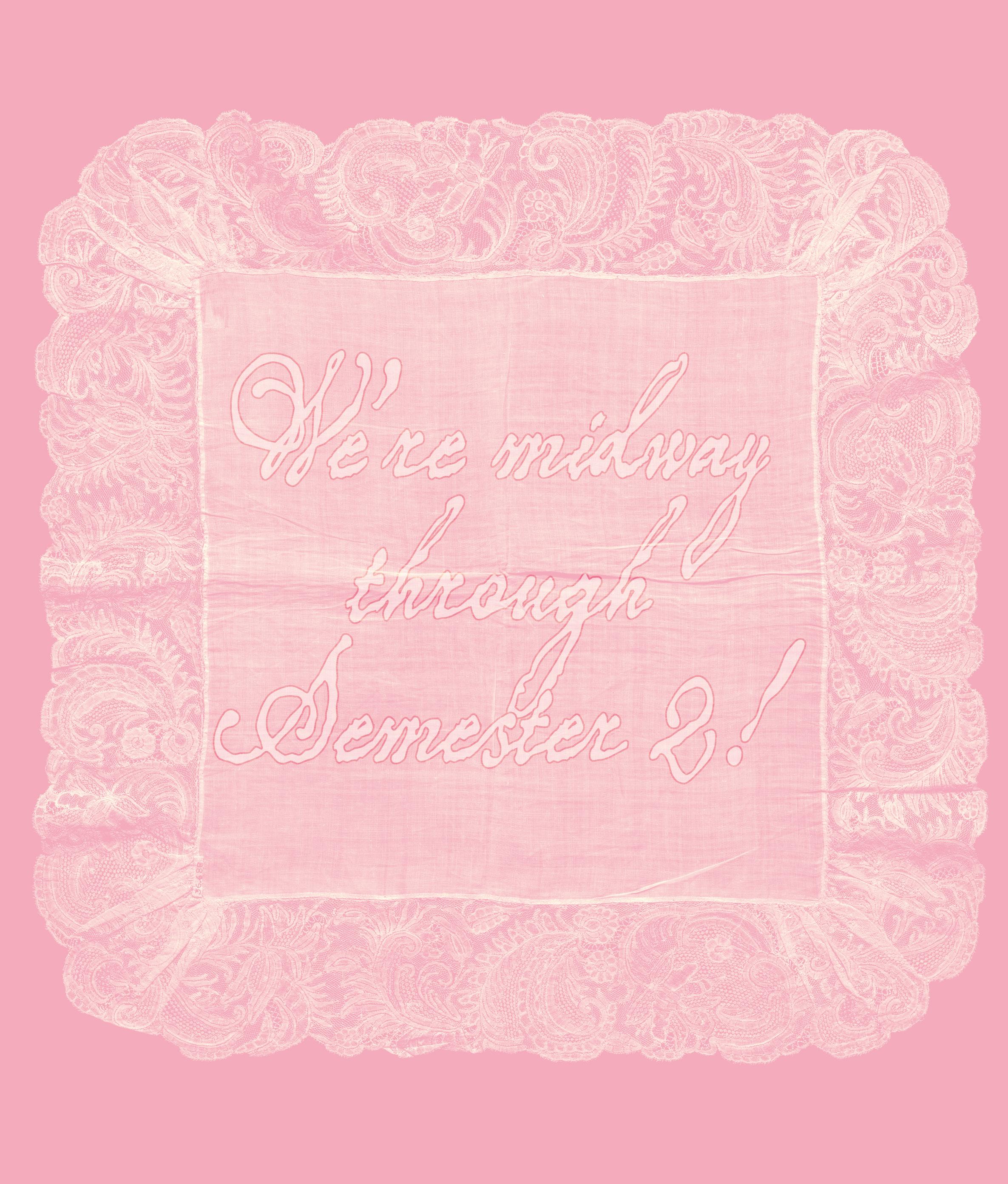
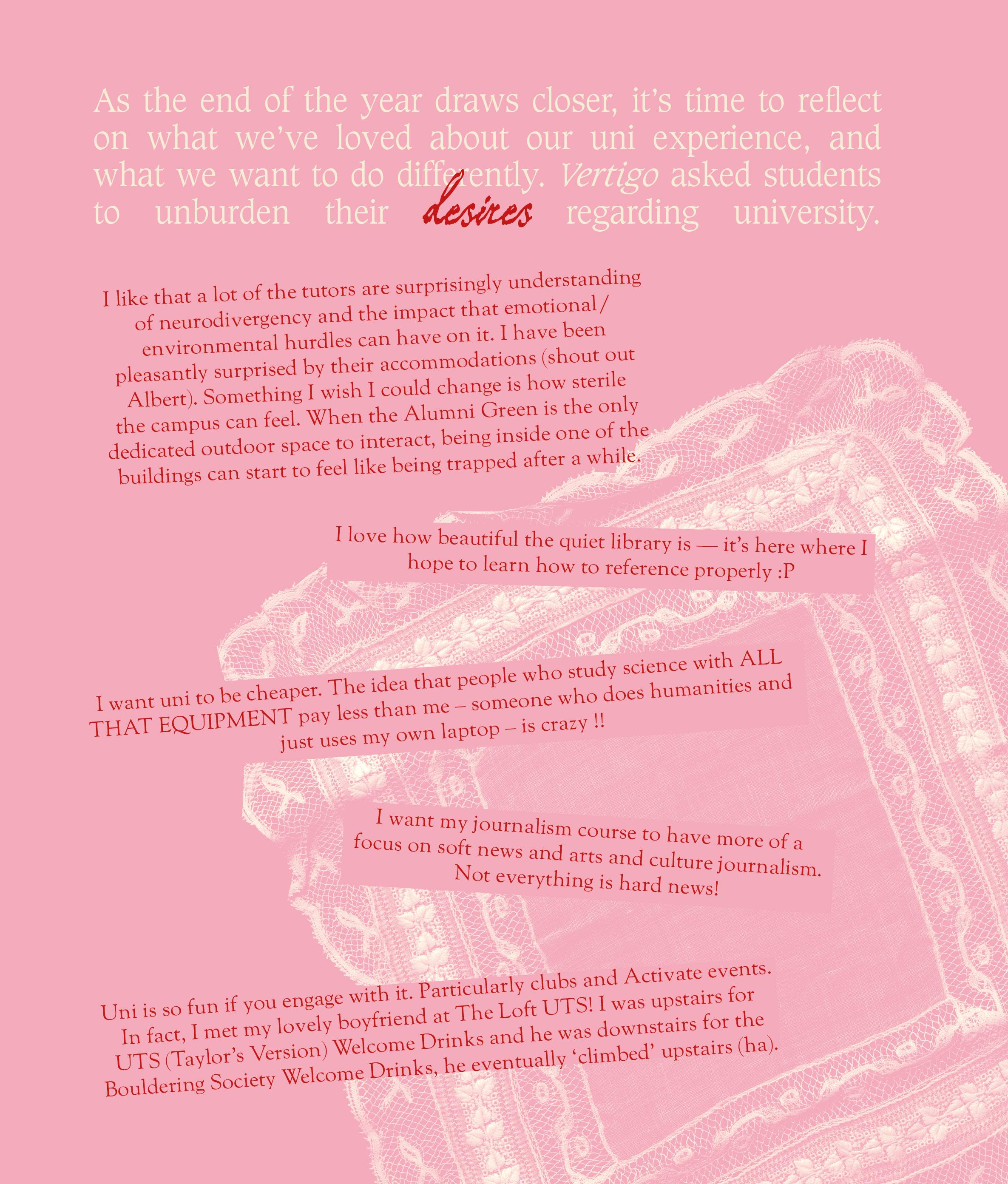

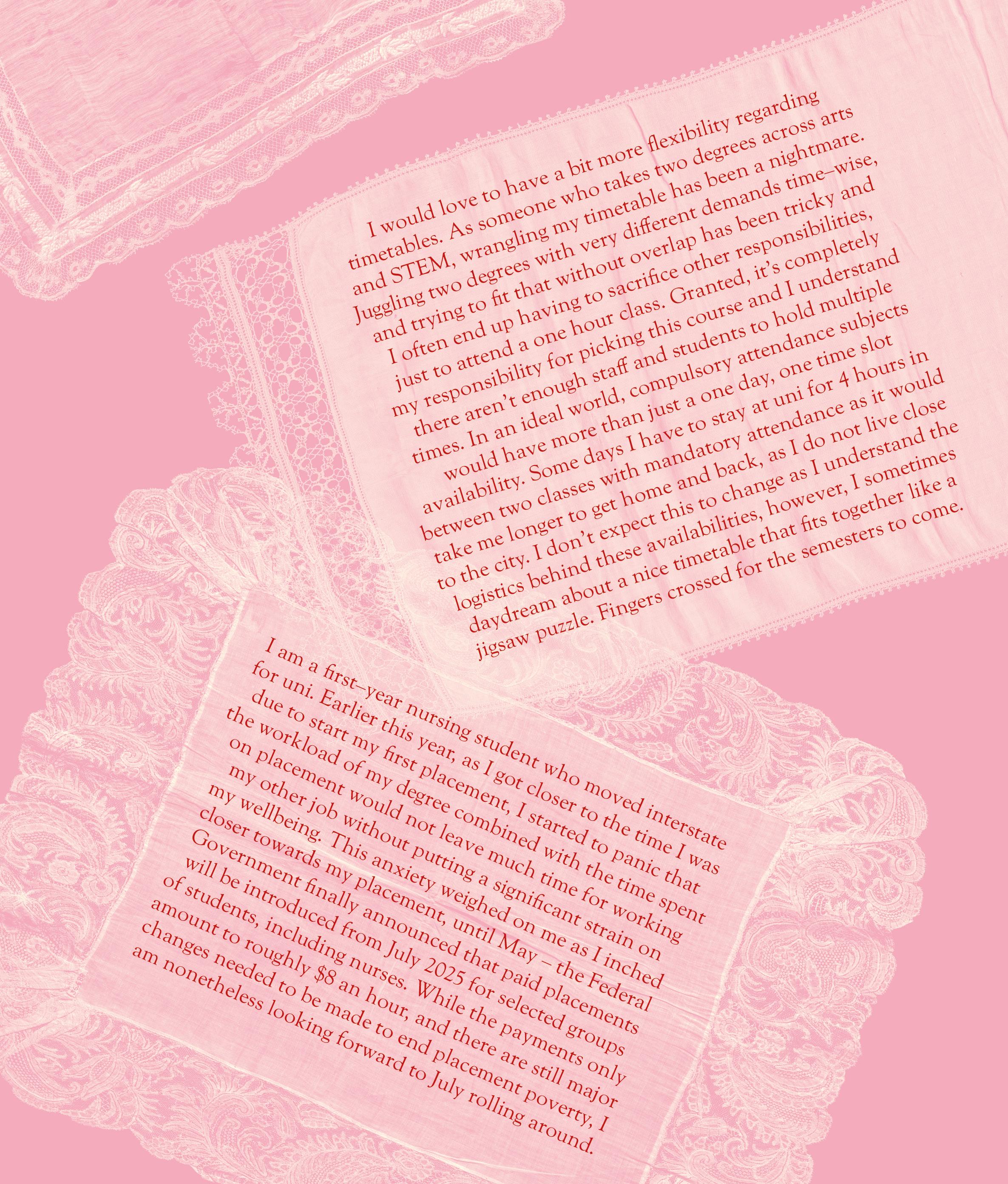

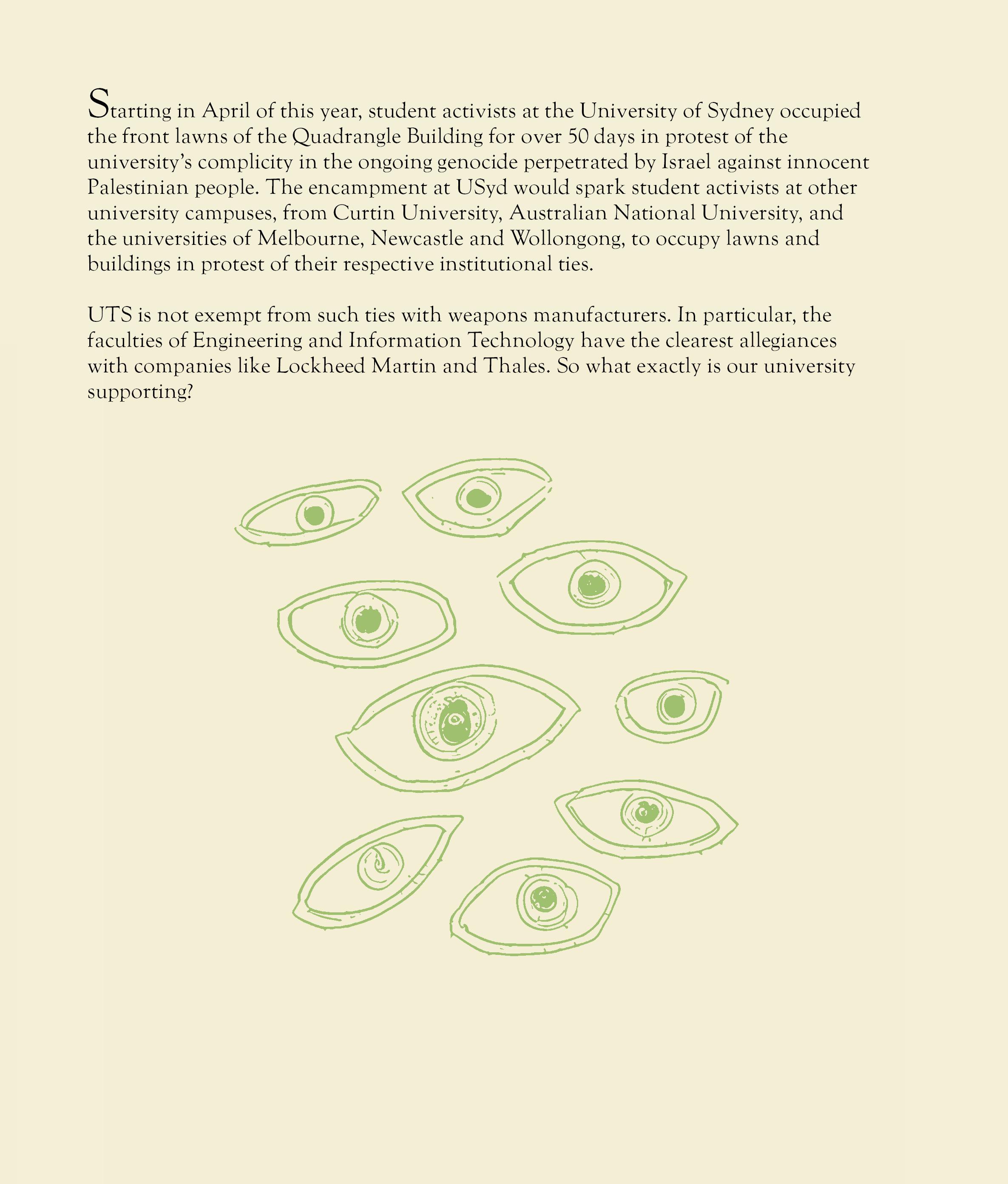
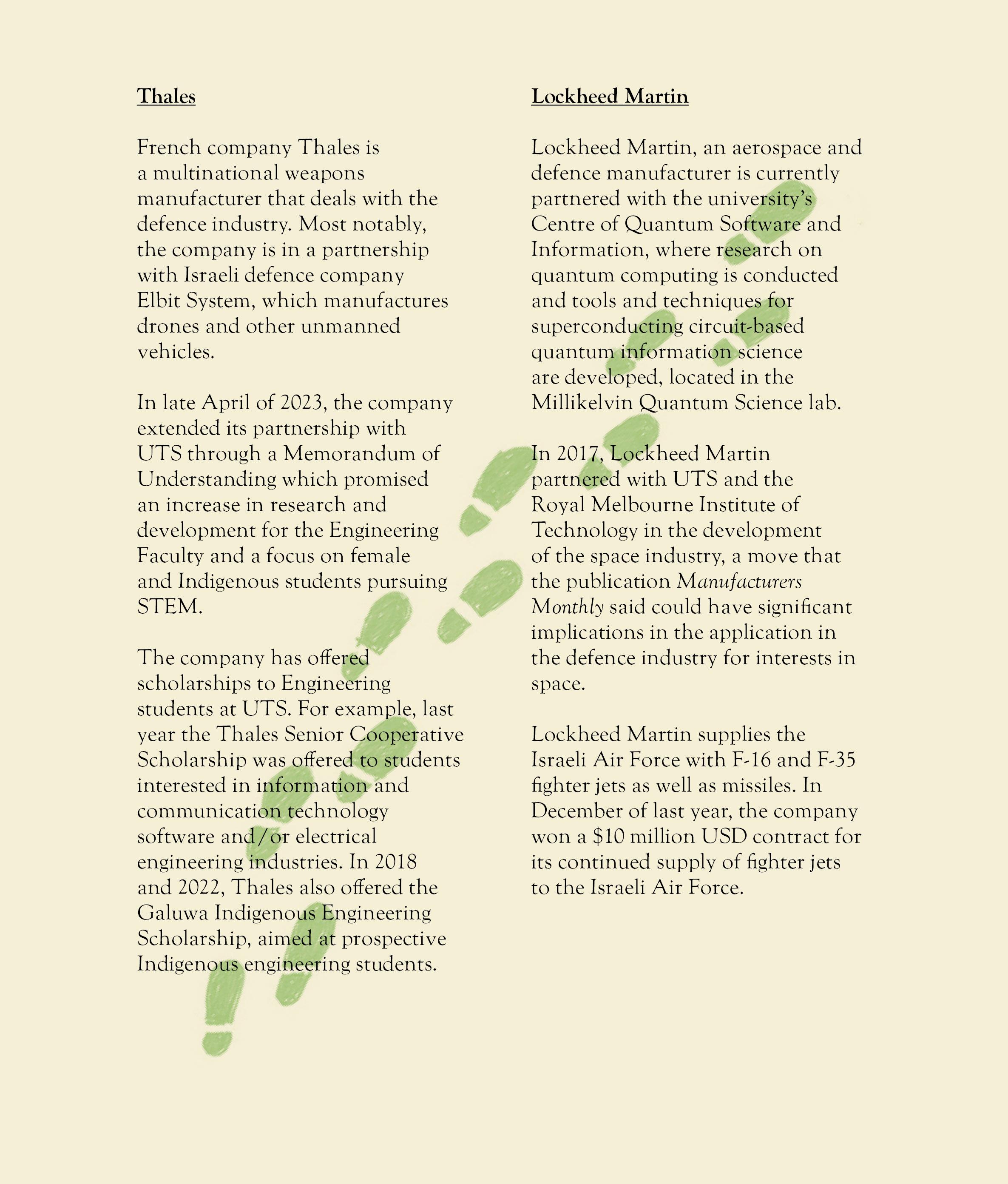



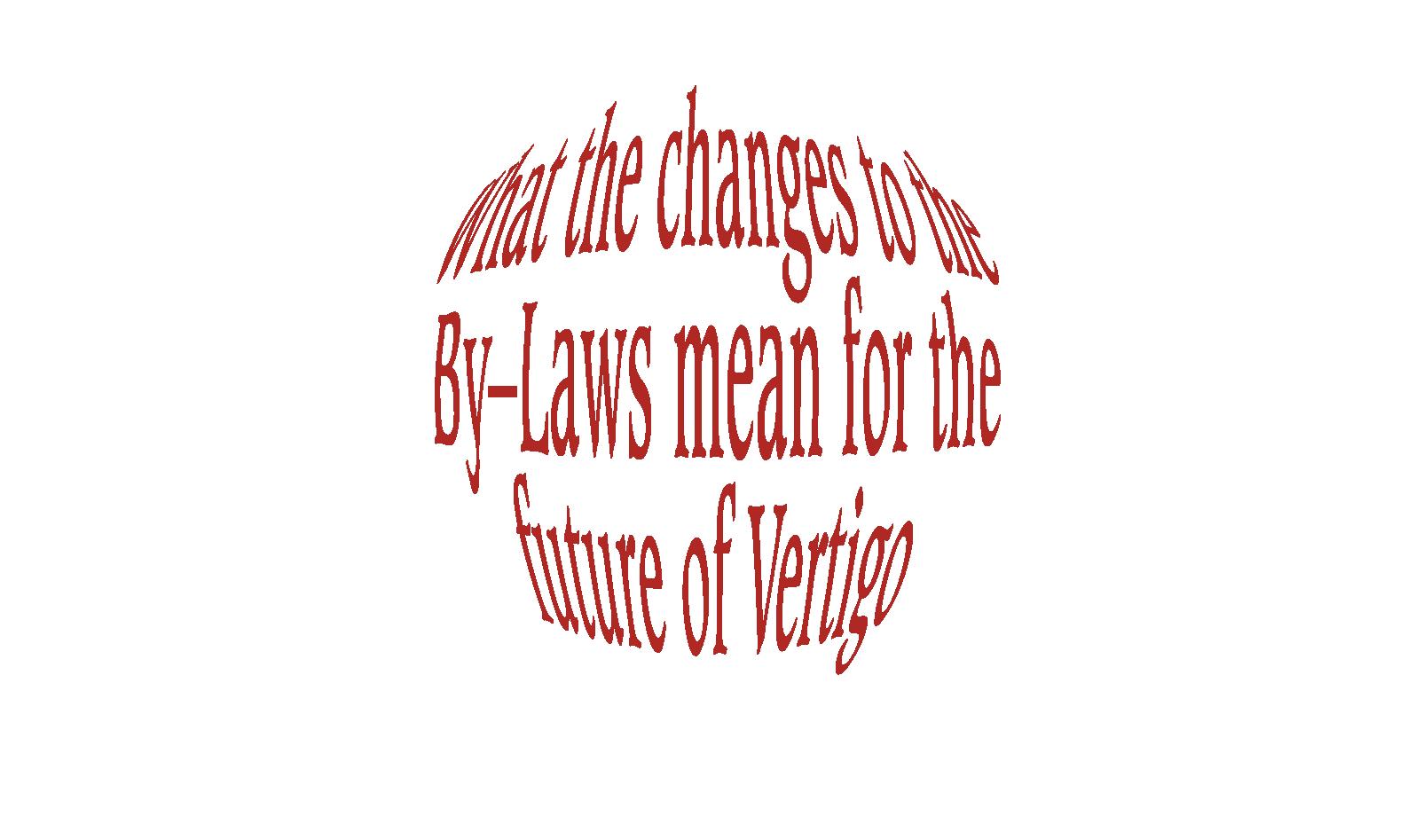
The UTS Student Association (UTSSA) is a student-run organisation on behalf of the students at UTS. They run campaigns, provide student services and advocate for the needs of the student body. Vertigo is somewhat of an organ of the UTSSA, meaning that we are funded by them. As – technically speaking – our investors, this means they also have authority over our creative output. The relationship between the UTSSA and Vertigo is complex, as we continue to seek creative and independent control of the publication while ultimately being managed by an organisation that generally does not majorly associate with Vertigo’s reputation. For example, when students see stacks of the new volume of Vertigo around campus, or stumble across our stylish Instagram, they aren’t going to immediately connect us with the UTSSA. This is of no fault of our own, as Vertigo presents itself as an art-based and often creatively experimental outlet for student work, which is not necessarily representative of the UTSSA’s image.
These differing ideations between what the Vertigo editorial team envisages for the magazine as a publication and as a brand, versus what the UTSSA envisages, is where the problems begin to arise. The UTSSA’s vision for Vertigo informed their new bylaws that were passed in the June 2024 UTSSA Council Meeting. They will officially be enforced by the General Secretary for the 2025 Vertigo editorial team. Bylaws are rules put in place by an organisation to regulate itself and to provide guidelines. In our case, the UTSSA made bylaws that attempted to do just this, but which also worked to restrict our creative and overall control and editorial vision for
the magazine. The by-laws are to be taken seriously because of the interconnected, established relationship between Vertigo and the UTSSA. The development of these by-laws have been discussed internally within the UTSSA and are based on the data collected from a survey conducted by a research company hired by the UTSSA in May of 2023 which was paid for using Vertigo’s budget last year. Essentially, the survey and the actions that have followed suit have occurred as the UTSSA believes we are not producing enough content related to UTS as an institution, or in other words, “student news” (which in the past has been an arguably ambiguous term).


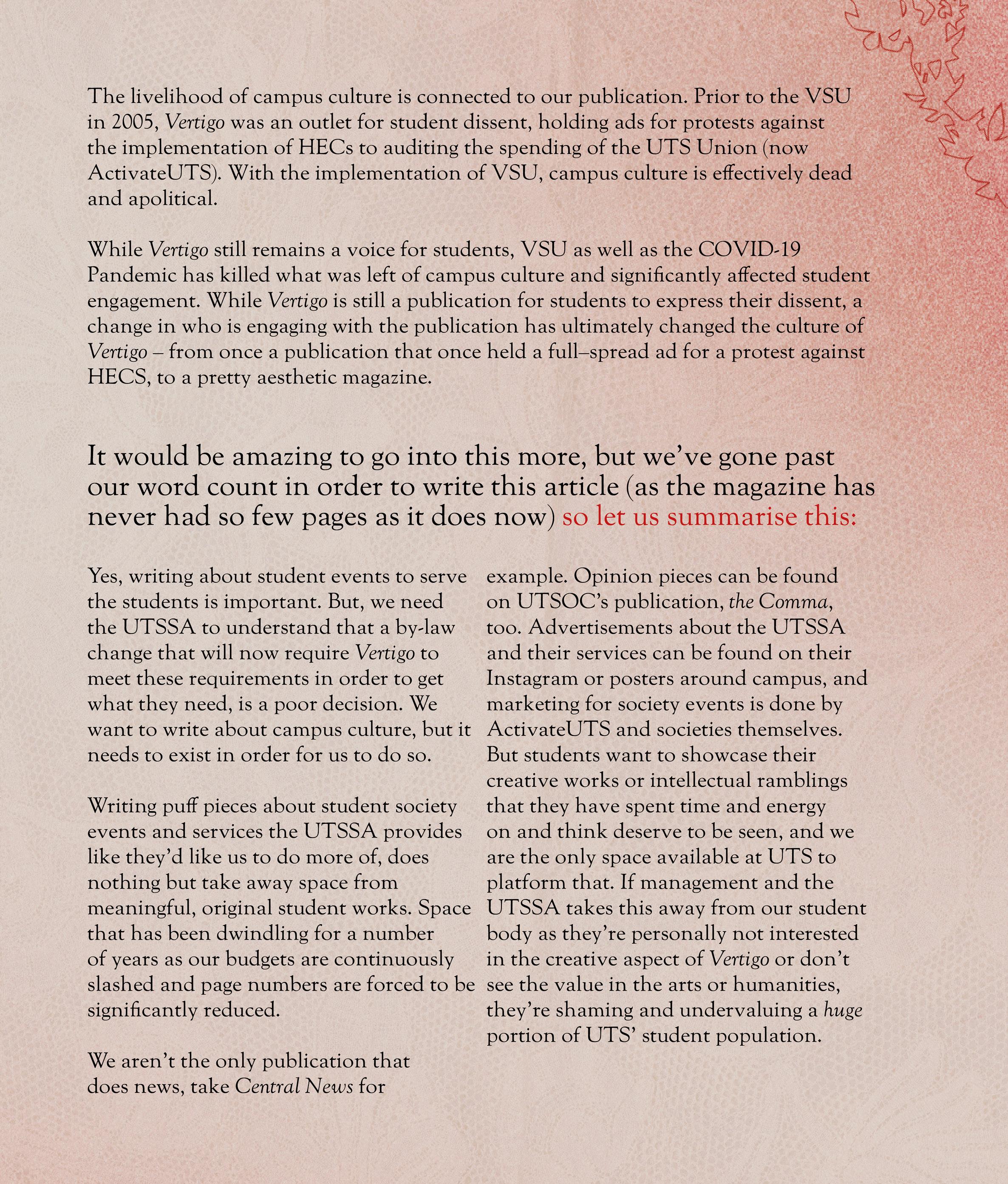
In response to this article, UTSSA General Secretary Adam Levett and President Mia Campbell released a statement, rejecting the assertion that the bylaws constitute censorship or limit creative freedom. They countered that they,
‘...[R]eject any assertion that the reforms passed in June constitute any form of censorship or limit on creative freedom. Rather, they adjust the proportion of non-fiction pieces related to UTS required for us to invest in printing physical magazines. This is not a mandate on what can and cannot be published, given that these only apply to physical copies and Vertigo is free to publish a different percentage breakdown in online editions of the magazine.’
They continued that,
Yet while this point is valid, the data collected from our social media analytics, alongside the proportions of submissions we receive per content category, overwhelmingly preface that our readership has its base in the design, creative writing, and arts sectors of UTS.
The UTSSA also rejected the comments this article has made on campus culture, stating that it is ‘insulting to hard-working student societies who put on countless events every single year.’ While this article does not undermine the hard work that both societies and faculties endure to establish as much campus culture as they are able to – and who do so to such a commendable standard – it is our opinion that comparative to other universities such as USYD, where campus culture is rife, there is simply less to report on at UTS on a week-to-week basis. This is felt by all societies, student-run organisations and even organs of the SRC such as Vertigo, where post-covid membership remains at an all time low. This is not to discredit work, but is a fact of 2024 uni life. Students are simply not as engaged with their universities as they once were.
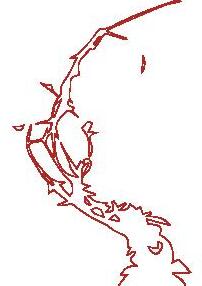
While we honour the statement made by the UTSSA, our point remains the same. We of course care about preserving this publication in the way that it currently exists. We commend that the UTSSA is attempting to evolve that according to valid research, but
we are sad to see it change.
‘These proposed by-law changes stem directly from student media research conducted in 2023. When asked what content should be included in Vertigo; “Community and University Activities” averaged 17% whereas “Creative content” averaged 11%, the research showed a significant student preference for accessing content via digital platforms, with 91% of students finding a digitalonly version of Vertigo appealing. Given the high costs of print editions, it is both practical and reasonable to expect that print content focuses more on topics that resonate with a broader student population, while other creative content can still be freely published online.’ Their full joint statement can be found via the QR code at the start of this article.
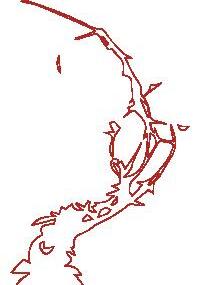




Nominations for the UTSSA + Vertigo Student Elections are now open
Scan the QR code for more information




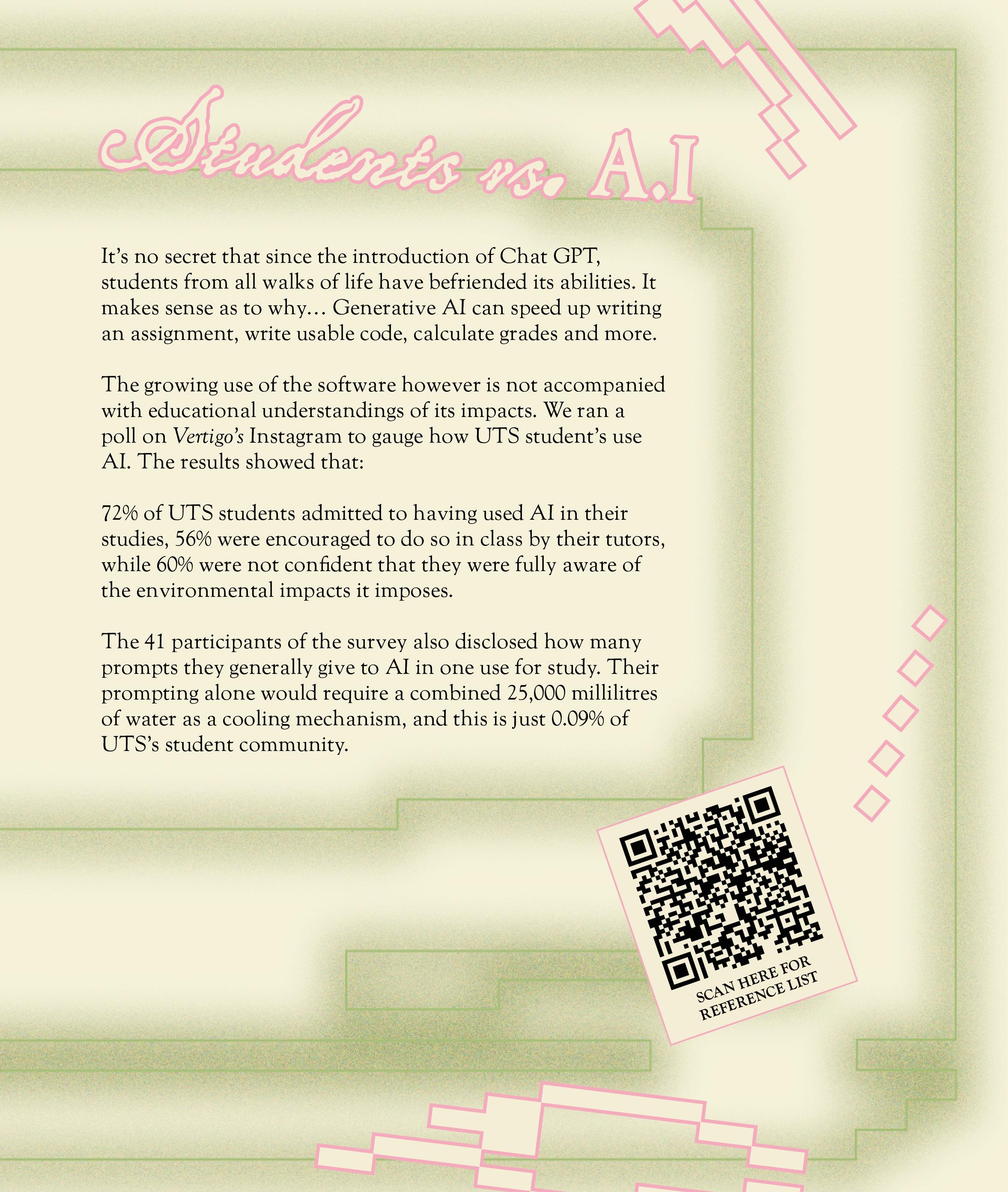
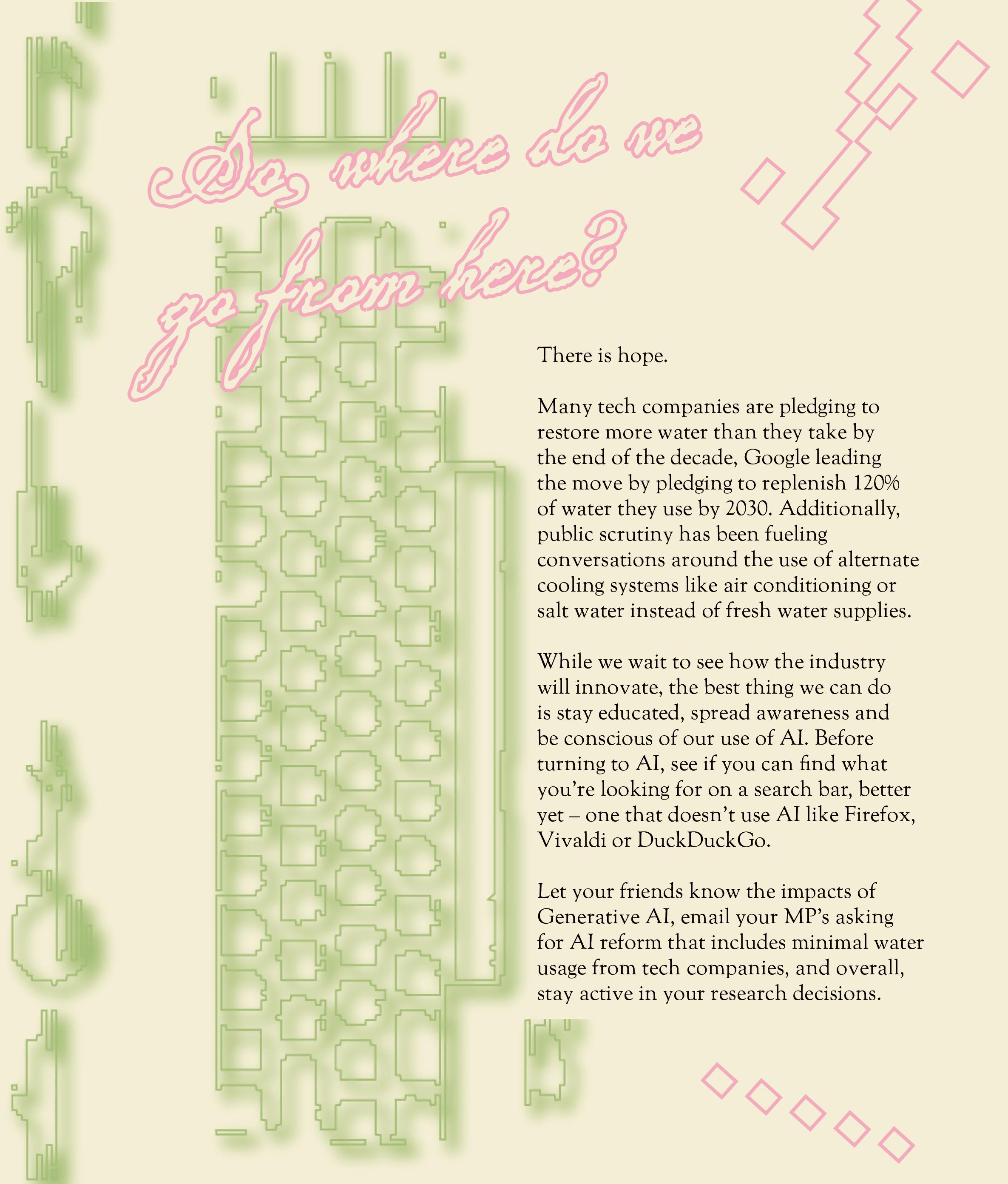

Get involved with your UTS Students’ Association. utsstudentsassociation.org.au facebook.com/UTSStudentsAssociation

TW: Cannibalism
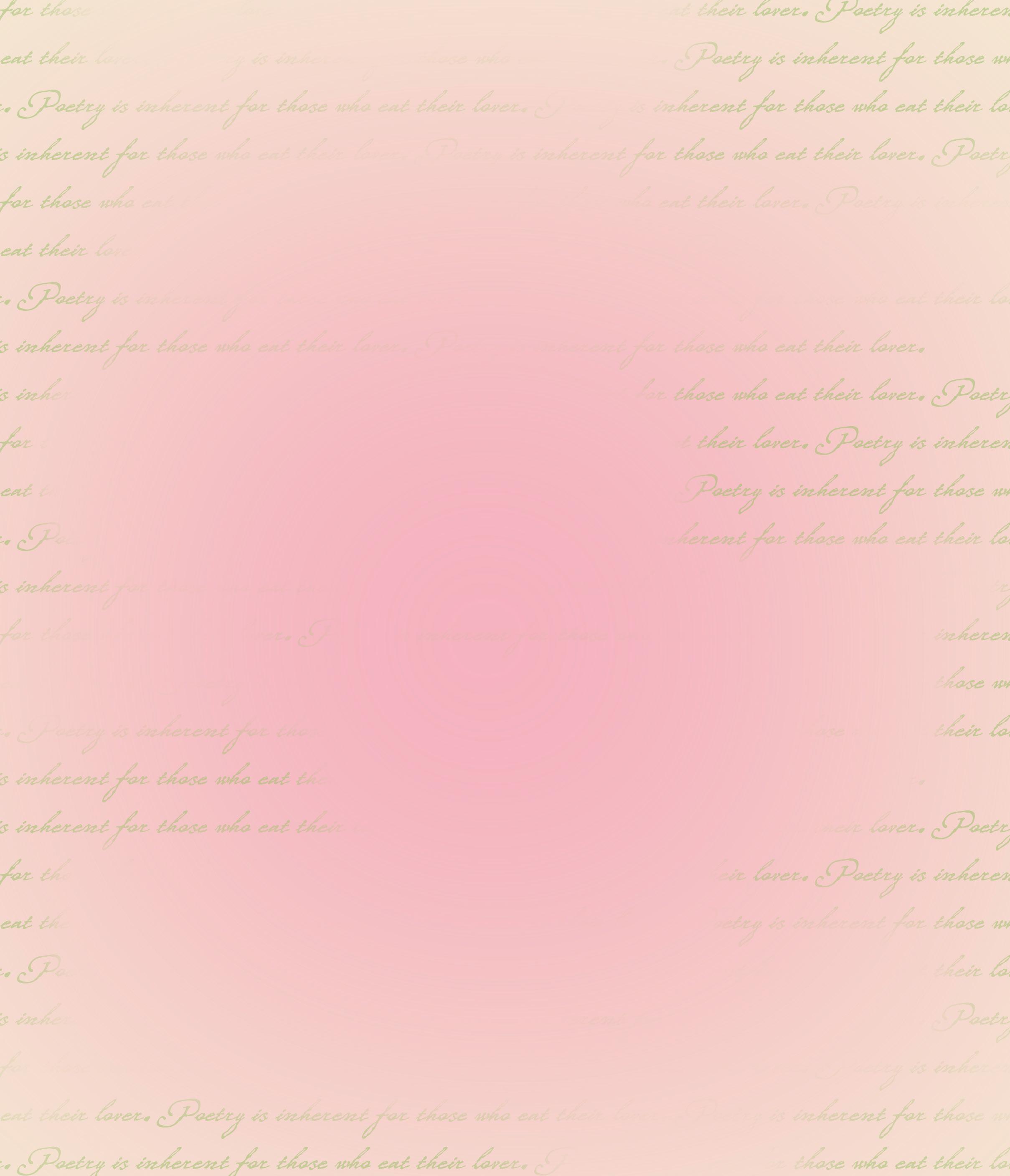
From eating for alimentary ingestion to desire to be as intimate as possible with a lover, might cannibals offer didacticism in relating to the other as no different than the self? Taboo as masticating on human flesh is in reality, art has possessed the ability to wield the pen, paintbrush, and camera to metaphorise cannibalism for centuries. Perceptions of barbarism and the grotesque are thrown out the window when love softens all, including eating a lover.
Poetry is inherent for those who eat their lover. The tenderest form of love communicated through the most vicious act of voracious consumption; eaters have no choice but to exist in paradox. The cannibalism of a lover entails a carnal desire to completely consume the otherness of their partner to fulfill a level of intimacy that conventional expressions of desire cannot facilitate. The craving to be utterly whole with the lover is only satisfied when their bits of flesh, blood, and bones are within them. For eaters, love is not merely the flutter of the heart, but a holistic bodily experience that commences from an obese ache to be as intimate as possible with each other.
Luca Guadagnino’s Bones and All (2022) is the quintessential ode to eaters in the film world. Maren and Lee discover a level of intimacy that is only able to be understood by being isolated and othered by society due to their shared identities. Their sheer magnitude of love is only able to be satisfyingly achieved by becoming holistically a part of the other, by eating bones and all. Lee spends his last moments in Maren’s arms pondering his sins. Like church-goers consuming bread and wine to worship the body of Christ, eaters devote their love like religion. Desire is never as intimate as that of those who literally consume each other.
LYNN LEE (she/her)
El Potts (they/he)
[Victims, women especially, are left with nothing after being subjugated to the violence and manipulation of men. All we have are our fists.]
Somespoilerswillbe mentionedahead.
Last year, my partner convinced me to play a game called Divinity: Original Sin 2 by a game studio that you may have heard of: Larian Studios, who also created Baldur’s Gate 3. My expectations were exceeded and I fell in love with the fictional world of Rivellon, and the game’s six companions. The premise is simple; you, the player, are a sorcerer, a practitioner of highly illegal ‘source’ magic, who has been tasked by one of the seven gods to ascend to Divinity. Though, what seems like a simple ‘chosen one’ plot on the tin is actually a much richer narrative. I only recently finished my first playthrough of this game, and will be analysing the questlines of the game’s female companions, Lohse and Sebille, applying what I have learned surrounding video game studies.
The One Rose Lost in a Forest of Daggers
Sebille is a victim-survivor of slavery and human trafficking, kidnapped and forcibly trained into becoming an assassin for her slave master. Her cheek was branded with a magical scar that binds her to The Master. Now that she’s free, she is determined to kill every person responsible for her enslavement.
Her weapon of choice is the same that The Master gifted her whilst in captivity. Sebille is poetic –she’s a well read, intelligent scholar who often speaks in prose, going very much against the (quite frankly, racist) stereotype of slaves being uneducated. When talking about how she escaped slavery, she tells a story of how the smallest crack of light was what gave her enough strength to break out of captivity. Her true weapon is poetic justice.

Credits to @hikimango for the illustration.
In fact, I find Sebille refreshing in a sea of lawful good protagonists. Larian allows her to do bad things unapologetically and yet also be more than that. Sebille has a motive, and once she’s reached it, she’s willing to end her crusade.
“Beyond the blood hides nothing but a desire to be happy,” she says. “I can only hope that is not too terrible a crime.” At the end of the day, isn’t that what we all want?
A key theme with Sebille’s character is an exploration of her identity. Who is she outside of her status as a slave? When she is forced to face her past before her enslavement, should she try to run away from it? Or should she embrace it?
In Rivellon, Sebille is racialised due to her status as an elf, which is integral to her character. Her race is weaponised by strangers and abusers alike, and Sebille’s enslavement echoes the very real displacement people of colour (POC) have experienced and continue to experience in our world.
When Sebille kills her abusers to secure her freedom, she questions if she’s the same as they are: a monster who takes joy in ending lives. What makes her different from them?
In my opinion, I don’t think it matters. Sebille’s morality isn’t black or white, and it doesn’t need to be. Her morals don’t change what happened to her, and she doesn’t have to be a good person.
A Gold Star Inn for the Disembodied
In many ways, Lohse is Sebille’s polar opposite. She’s a natural performer, renowned bard, incredibly charismatic and personable, and a bit of a jokester. Unfortunately for Lohse, she is dealing with a slight demon problem which is making life harder for her. Whilst some people are dealing with metaphorical demons, Lohse’s is quite literal.
It would be amiss to ignore the obvious allegory for mental illness, though Lohse’s writer, Sarah Baylus, explains that “ while I wasn’t actively trying to write her storyline as a particular allegory, I was actively trying to write something that felt real to the labyrinth of my internal life.”
So much of Lohse’s character is resonant with my own experiences of mental illness. Like Lohse’s
demon, mental illness can be all consuming, taking away everything that makes a person themselves. In my personal life, my mental illness causes me to see myself saying and doing things that I would never do in my rational state. It feels like someone else is piloting my body. But Lohse’s story reminds me that I am responsible for my actions, and I must learn how to defeat my own demons.
In Lohse’s case, the demon intentionally manipulates her into believing that all she has is him. That he chose her because she is special, that she doesn’t need anyone else. That he’s proud of her, that he loves her. Yet in the same breath, he belittles her and diminishes her to being a “stupid girl”. I think this dialogue also highly resonates with an abusive relationship, linking back to how Baylus didn’t write Lohse as an allegory for any one specific experience.
Typically, the bard fills a comedic, supporting role, and serves as a source of inspiration. The irony in Lohse’s situation is that she tries to be her usual, upbeat self, yet she has such a strong force of negativity and destruction existing within. Despite all this, Lohse’s positive characteristics shine through.“I would’ve preferred not to know how dark the night can get. How close you can stand at the edge of oblivion and feel… nothing.”
Darkness is all consuming, as Lohse rightly points out.

But perhaps it is possible to walk away from that edge, to return to oneself despite nearly losing everything.
I’
m not the first nor the last person who has noticed the parallels in Lohse and Sebille’s stories; in fact Samantha Greer points it out as well. Both are women trying to escape the control of their abusers, both are individuals who require support in this, so it would make sense if they both leaned on each other as their support systems.
Interestingly, Lohse and Sebille both have their own complicated connections to music. Lohse can no longer sing or play music under the demon’s control. If she attempts to play her lute, the demon will destroy it. As for Sebille, her scar gives The Master the ability to control her like a puppet through her “scar song”. If you romance Sebille, she will teach you this song to stop The Master from controlling her. Romancing Sebille as Lohse adds further depth to this interaction. Greer sees it as “a moment of closeness, a validation of Lohse’s talents and a sign of trust that she’s often been denied due to her demon.”
I recently stumbled across the song ‘Salad’ by the Los Angeles based artist Sabrina Teitelbaum, who goes by the moniker Blondshell. The dissonant guitar and visceral lyrics immediately captured my attention, and I think it perfectly epitomises female rage. “Salad” tells the story of supporting a friend after they experience sexual assault and trying to navigate a broken justice system. Teitelbaum exclaims her fury at the
perpetrator’s heartlessness, pointing out that he has ‘a stone in [his] chest cavity’. Being a pacifist, she states that violence is not typical for her, and that ‘within the framework’, she cannot achieve justice.
The song concludes with Teitelbaum repeatedly shouting ‘(be)cause we were never violent’. That lyric is stuck in my mind to this day. Victims, women especially, are left with nothing after being subjugated to the violence and manipulation of men. All we have are our fists.
To me, this lyric is emblematic of the journey of Lohse and Sebille’s lives. In a discussion with my friend, I mentioned how I found it really powerful that both the main female characters in this story are victims of the actions of men, and both are on journeys to kill their abusers and live their lives free from them. Neither one of these characters were originally violent people, but their experiences of trauma and the abuse they have been subject to have forced them to become violent. Yet both of them learn to accept help on their journeys to become free. There’s canonical basis for a connection between the two: Sebille has a voice line pointing out how Lohse looks at her ‘lovingly’ one night, and
there is so much power in the concept of two women learning to love again whilst helping each other defeat their (metaphorical and literal) demons. So, what is the point of all this? Why does it matter?
To me, it matters because this game is something I am truly passionate about, one that has taught me so much about myself. I played this game a lot through a really difficult period in my life, where I wished I could get my revenge on every single person who ever hurt me. Though this game has its imperfections, it has truly touched me in a way that matters.
Finally, dear reader, I will leave you with this sentiment. A voice line associated with this game is one that the characters proclaim in battle, “I yield to none”, and that is what’s so powerful about both Lohse and Sebille. Neither one of them yield, they keep fighting back against those who chose to hurt them. We all fight our own battles, write our own stories. I choose not to yield in my own life, to persist despite the rocky paths I may encounter.
That is the point of all this.
Thisisanexcerpt ofa longerarticle.Youcan readthefullpieceon ourwebsite(utsvertigo. com.au)
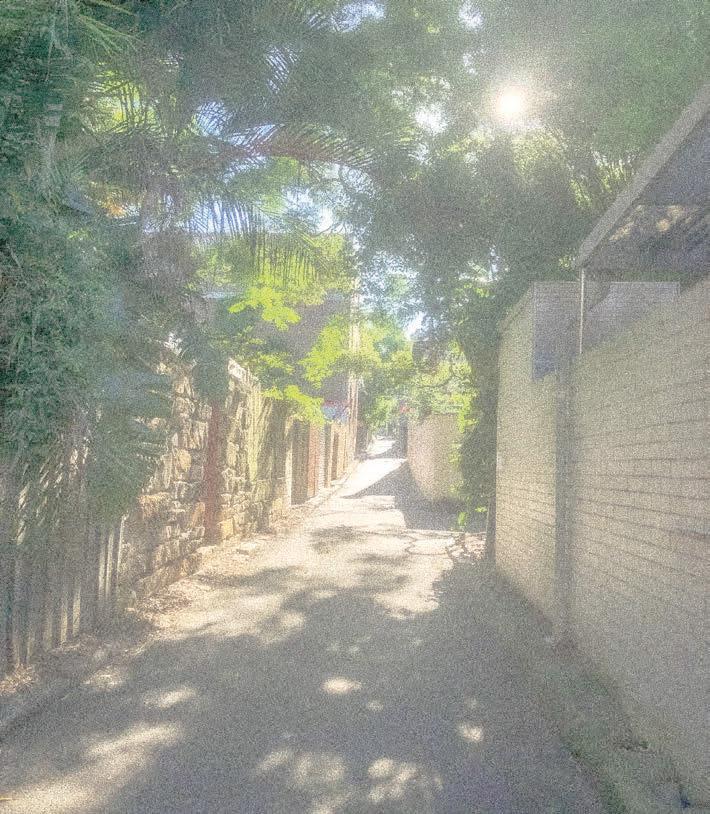
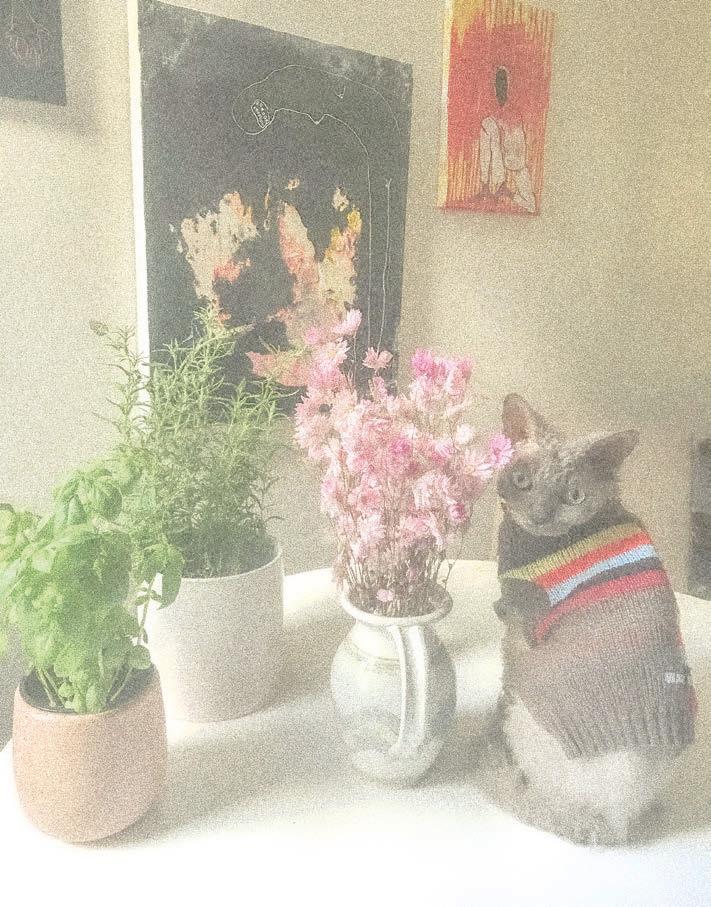
When I was 15 and in boarding school, I would take an hour-long train and a 25-minute bus on the weekends from the North Shore to Paddington, where my sister lived alone.
I had my own room, but I liked hers better. It was a mess of clothes that I wanted to have as my own. Her walls were covered in tarot cards, pages torn from photo zines, and her own drawings. She had no bed frame, just a mattress on the floor. I thought this was brilliant and wanted the same (unfortunately, my dorm furniture was ugly and built-in). Light filled the room in a perfect, Saturday morning way. When my sister went to a party or her boyfriend Olly’s house down the road, I lay on the unmade mattress for hours and wished I didn’t have to go back to school.

We campaigned to live together when I was a teenager and our mum moved back to Queensland. Mum was against it, saying that Stasia, at 20, was too young to look after me. But she did, anyway. She taught me how to cook – things like dahl and shakshuka. She taught me how to layer my clothes and how to protect myself against our dad’s volatile personality. She taught me about plants, of which she had an impressive collection: sprawling elephant ear leaves that glittered in the sun and lime green-yellow vines that draped over the sides of kitchen cupboards. How to find good stuff at the markets, how to deal with depression. How to care for an animal – although, I don’t know that I will ever be able to do it as well as she did with Coconut, our family cat that she took on as her own. She even looked after me when she got sick. Even when she never recovered.
In my final year of high school, I spent my winter holiday staying on the couch of the sharehouse Anastasia lived in with Olly, three of their friends and Coconut. I was boarding and my sister was renting again – living situations neither of us had wanted but which were ultimately better than living with our dad, which we had barely coped doing the year before.
The house at Rose Street was mouldy, uninsulated, and far too small for 6 people and a cat, but I loved it ferociously and considered it my home too. That holiday, my sister showed me how to make laksa which warmed my body from the inside out. We sat on her bed and cried together as we recounted the nightmares we had where our dad killed us with various weapons (in hers it was a gun; in mine, a machete). I went on my first-ever date with a girl, wearing one of Olly’s shirts. Sometimes, he would sleep on the couch so I could sleep in their bed next to my sister. I always slept well in that bed. The bedroom had a single but generously sized window that Coco would sit at to watch passers-by. I loved hanging out with my sister’s roommates, whom I considered my own twentysomething friends because they always included me in their jokes. Despite everything my sister went through that year, seeing her carve out a new life for herself made me hopeful that one day I could do the same.

I have that neighbourhood memorised from the hours I spent in Stas’ passenger seat, circling cramped back alleys and side streets for an all-day parking spot. When I graduated, I moved into student accommodation down the street and it became my neighbourhood. Even after my sister moved out, I knew that if I was ever in search of comfort, that house was where I would go knocking. The mould got so bad eventually that they all left, but even still I wouldn’t be surprised if I found myself on the doorstep by instinct.

I was thrilled when my friends and I managed to get a rental in the same suburb where my sister lived with hers. Her house was only a 15-minute walk away. I had my own key.
Whenever Stas was bored or depressed or particularly sick, she would call me and I would trot over and let myself in. I prided myself on my ability to support her, to be a good sister. I liked to cook for her and do tasks around the place: water the plants, vacuum the floor, take out the trash. It was around this time that I started getting sick a lot too, and each time I recovered a little less. But I relished my relative strength and any chance to make myself helpful.
Stasia and I watched reality television or played video games. Days spent doing nothing this way suited us both, as she was exhausted and I started having pain in my face so intense that I couldn’t think about much.
In the last year that she lived in that house, Coconut started to die. He was a Devon Rex: chubby, wrinkly and semi-hairless. He felt like a hot water bottle when he sat on your lap, and we adored him like a deity. Towards the end, we were swaddling him in blankets like a newborn and keeping him by an electric heater so he’d stay warm. Anastasia, Olly, and I sat on the floor of her bedroom and held his limp body for a long time before the euthanasia vet took him away. After that, it felt right for Stas to move. Even though I didn’t live there, it was hard to leave that house behind, because I had to leave him behind too.


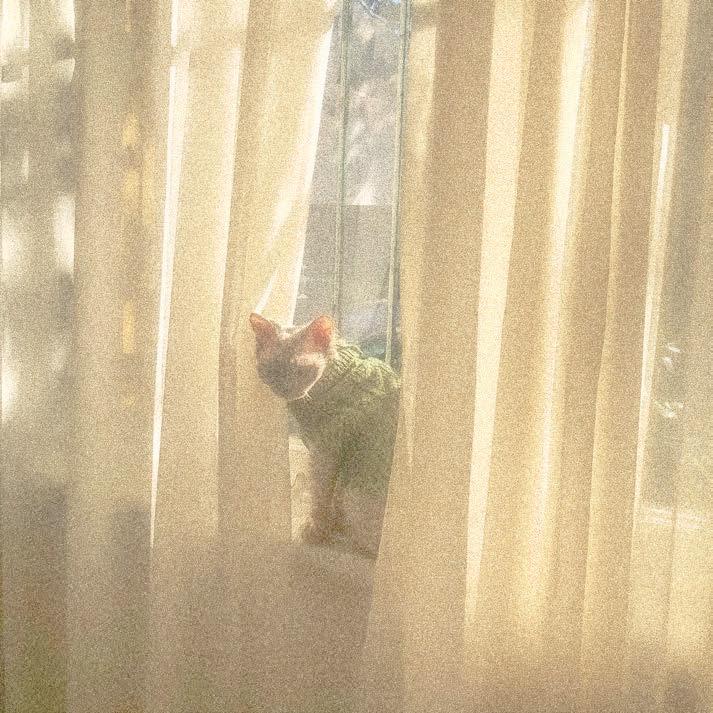
My sister is 25 now, and she and Olly have their own place. They call me at random and ask if I want to be picked up in 15 minutes. The answer is always yes.
I still go to my sister’s house whenever my heart gets broken. When my girlfriend and I separated, I cried in fear at the hole in my life that she would leave behind while Stas and Olly listened. They said that they would fill it. It’s funny talking about my relationships with them – Olly and Stas don’t even know if they believe in marriage, but when I think of what I would want for a lifetime, I don’t think of my mum and dad. I think of them.
Nowadays I am sick too, and I have to let my sister care for me the same way that I wanted to care for her. I never wanted her to return the favour.
My sister and Olly have taught me the value of owning things you like. Their apartment is full of plants and gorgeous mid-century furniture they’ve collected over the years. They have a bookshelf dominated by fantasy novels and cookbooks because annoyingly, Anastasia has only gotten better at cooking. They have an impressive collection of records and they eat out of ceramic bowls that feel gritty and crystalline in your hands. My sister has a family of stuffed animals that each have a name and fill me with overwhelming childish bliss. When Coco died, I gripped onto one for comfort. When she knows I am sad, she gives one to me to take home for a little while. There are sweets in the cupboard and it doesn’t matter if you eat them.

Home is a tricky concept for me. So is love. So is family. But going over to my sister and Olly’s apartment makes me feel better about all three. The older I get, the more I want simple things. More than anything, I want my own grown-up apartment, filled with nice furniture and lamplight. I crave the music of my favourite albums playing through speakers and a good window that lets in the sunlight. I want Coconut back, sitting on the windowsill like a nosy gargoyle. I want to remember to water my plants and I want to be good at caring for things. I want to cook comforting food and spoon it onto handmade crockery. I want clean and I want safe. I want to finally have my driver’s licence and know how to stand up to my dad. I want someone who loves me forever and wants to watch movies together every night. And maybe most of all, I want my sister to know that she taught me what it means to belong somewhere.



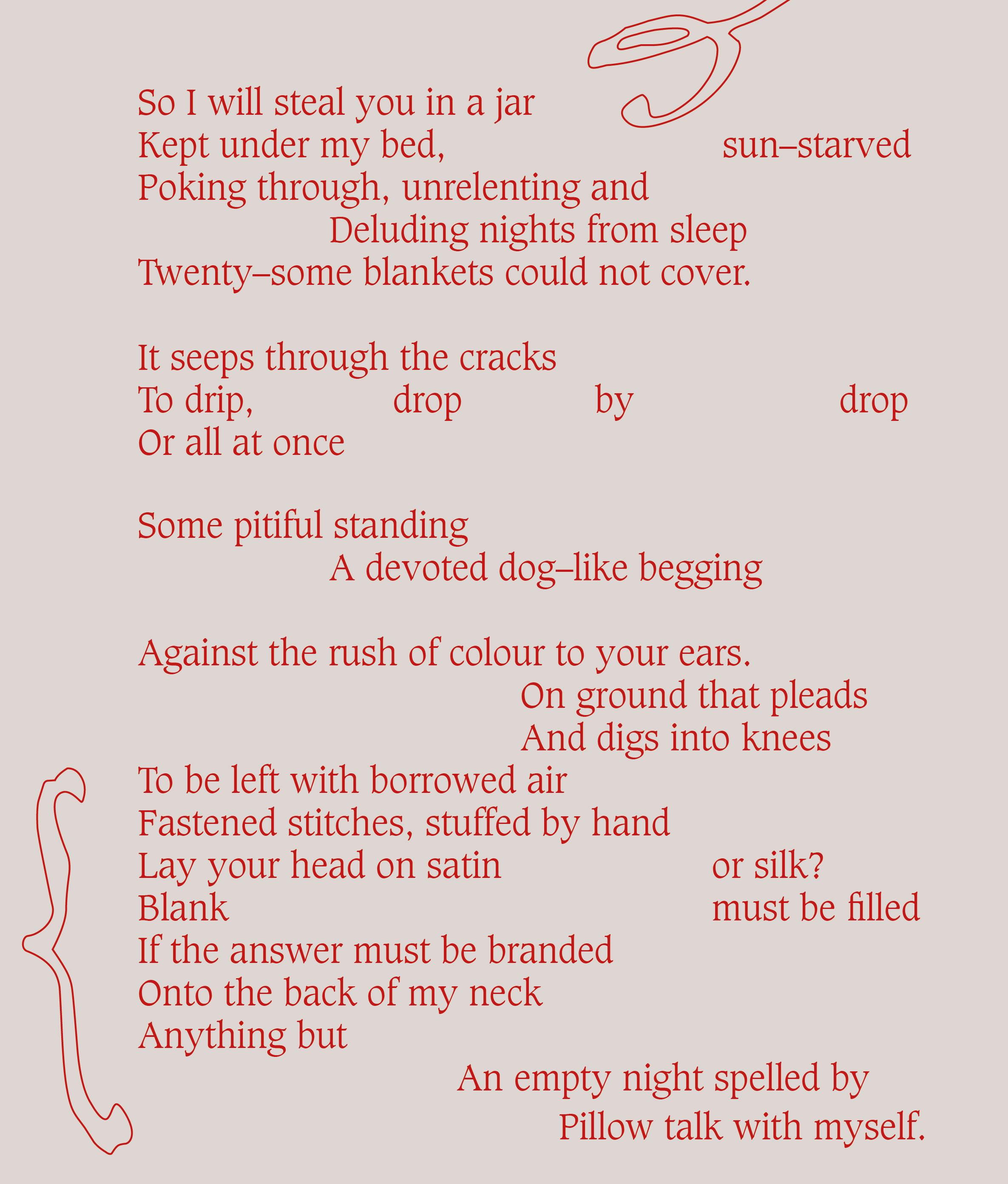

By Olivia Litver (she/her)
Sometimes I wish you were there as you are and that I was there with you. You are a boy and I wish that I was a boy and I wish that I could love you as a boy loves another boy.I wish I could trace my left hand down your body and trace my right down mine and search for clues that we are different and not the same. I wish I could look for the pieces of you that I could find in myself and notice the pieces of you that stick out through your skin that don’t stick out through mine and know what I have to break to make myself like you.
All I want is to be like you.
I wish I could bite your lip and kiss your tongue and taste the same bitter spice in your mouth that I taste in mine. I wish I could feel your strong thighs pressed into my strong thighs and allow the top of my head to meet yours and just stand there, relishing parts of my body touching the same parts as yours, melting together but also repelling each other at the same time, like both sides of two magnets. I wish you could give me muscle where I have fat and that you could give me strength where I have weakness. I wish our bodies could recognise, just as our minds do, that we are the same.
We are boys. We are men.
TW: gender envy
I wish I could grip your calloused hands in mine and feel the same slow, hard heartbeat (like a drum) that I feel in mine (now it’s a symphony, now we’re a band). I wish I could press my chest evenly into yours without fat and glands pushing us apart. I wish I could find my hips locking beside yours like a puzzle piece and I wish we could twist and turn around each other with that excruciating heat that we (us) boys give off, but remain, as boys do, dry. I want to lock my jaw into yours and let the coarse hairs on my cheek graze against yours without having to stoop down or stretch up. I want to be still with you and love with you and swallow you and absorb you and crush my body against yours and allow parts of me to shatter into parts of you like a stellar collision and I want it to be bright and hot and I don’t mind if I get burned, I swear. But I won’t promise. I don’t want to make any more promises with pinky fingers and try to give you everything you feel you lack because I do not want to love you like a girl. I want you to know that you are enough and you are everything and you are my whole world and we can be boys together. Boys who love each other and find pieces of ourselves locked away in the other but we are happy to leave them jutting out of each other and never have them back as long as you love me with my pieces and I love you with your pieces and we love each other as boys.


your UTS community Meet like-minded people in safe and supportive spaces. Find out more at utsstudentsassociation. org.au/collectives
Speak to our Student Advocacy Offcers for independent and confdential advice.

Book an appointment OR Drop in Tuesdays, 10:00am-12:00pm https://zoom.uts.edu.au/j/89791010171
Thursdays, 12:00pm-2:00pm https://utsmeet.zoom.us/j/12028173
UTSSA offce
UTS Tower Building, Level 3, Room 22 (02) 9514 1155
utsstudentsassociation.org.au/advocacy
Many (if not all) Australians are well versed with the failures of Centrelink as an institution. Tasked with providing Australia’s most vulnerable citizens with fortnightly income payments, Centrelink is notoriously known for the downfalls of its management, its hours-long wait call times, and its tendency to use the threat of criminal records as a way of keeping welfare recipients accountable. Yet what could be deemed Centrelink’s most colossal downfall, is the binary nature of the laws that govern its operation, which fail to cater to individual recipients’ circumstances. Instead, recipients must obey unmalleable terms, or risk losing their entire income.
Jemima and Charlie (who will remain under pseudonyms for anonymity), sat down with Vertigo to share their experiences of having their Centrelink payments reduced due to living with their partners. The Social Security Act 1991 (Cth) — which governs Centrelink’s operation — determines that when couples live together, they are considered to be in a de-facto relationship. As a result, their income streams are treated as one, regardless of whether the couples are pooling their finances. Both Jemima and Charlie expressed their discomfort at being characterised as in a de-facto

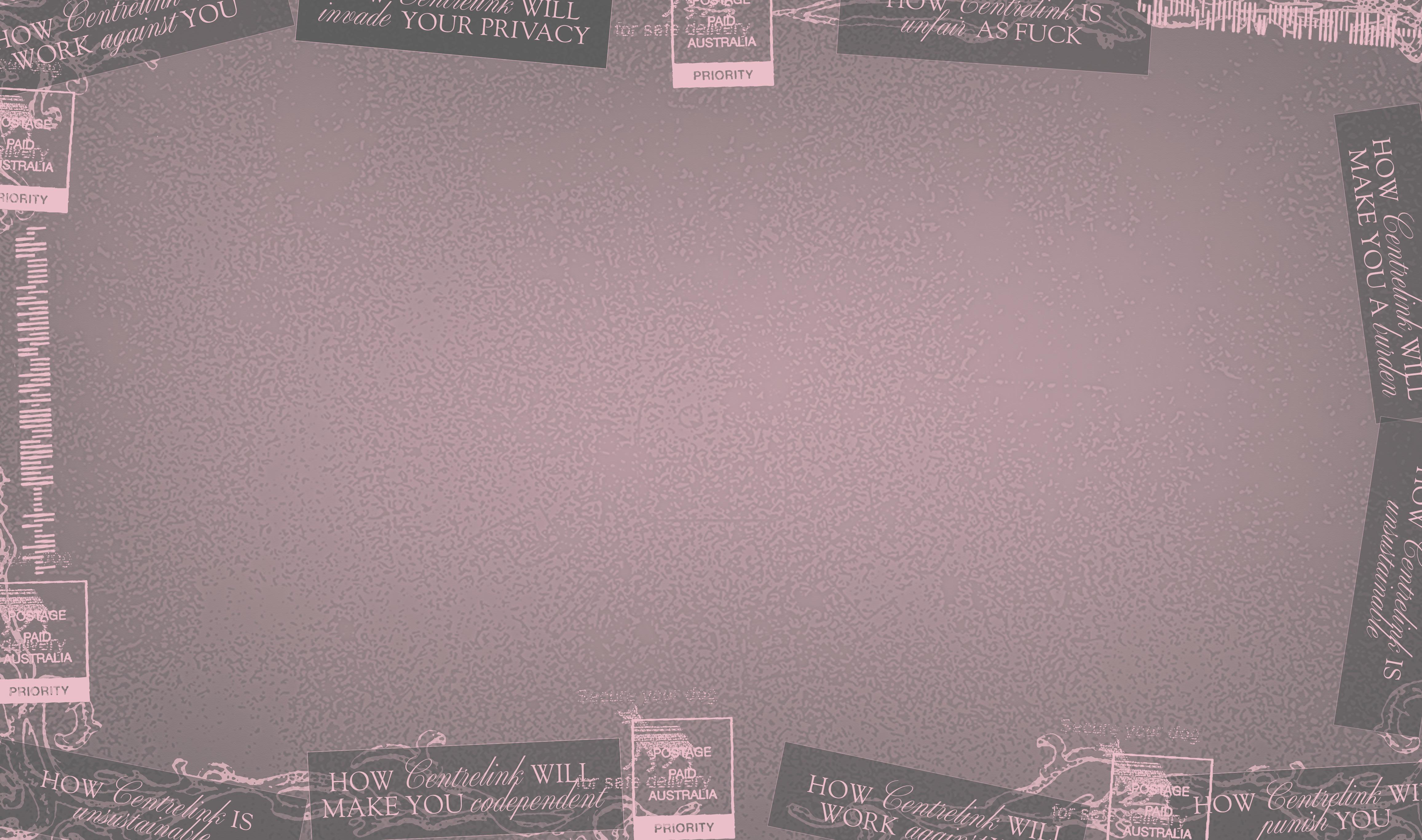
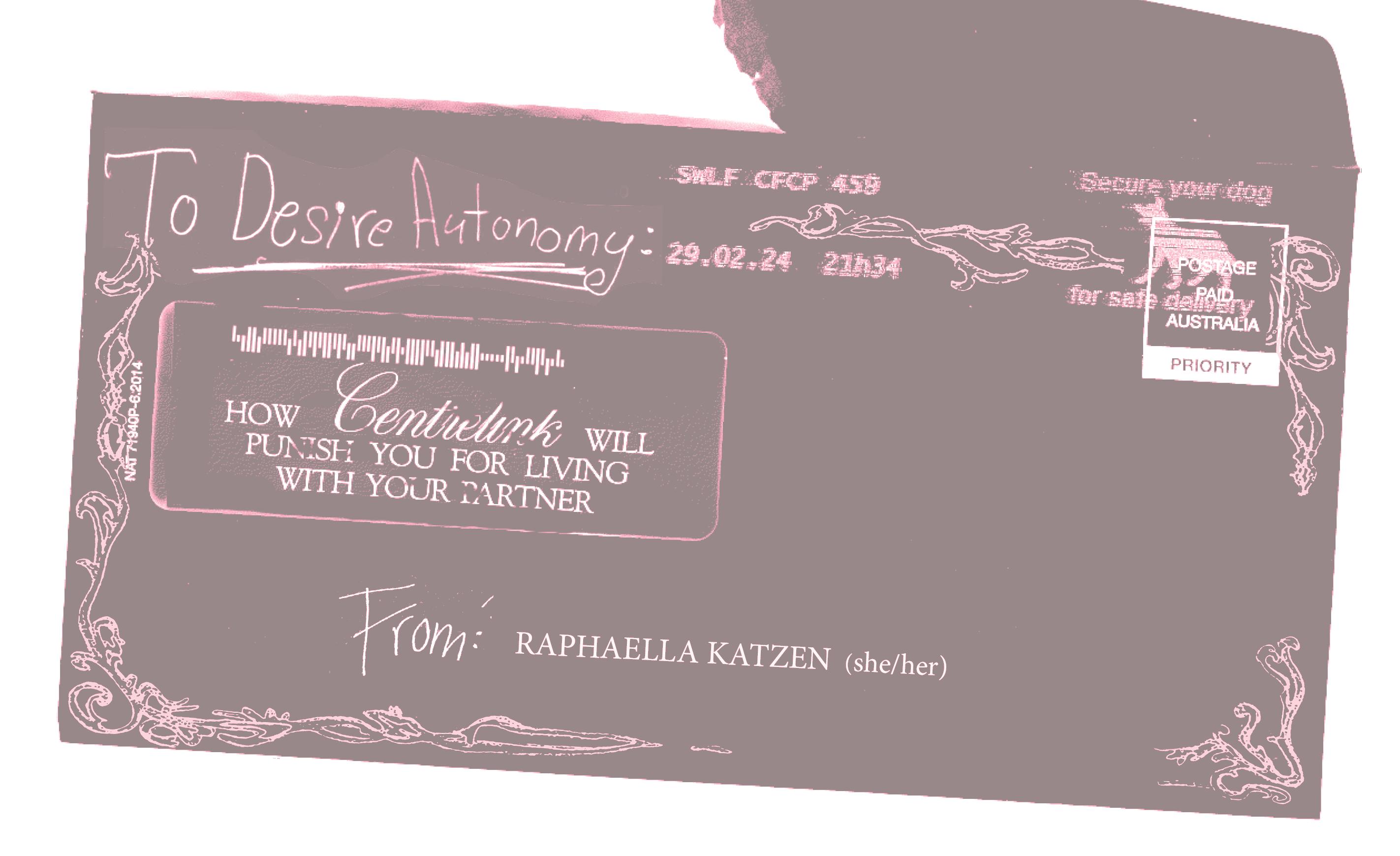

relationship – a term often applied to those in a marriage-like commitment. Both also disclosed that in reality, they lived with their partners as they were unable to afford housing in the current market on their own, and chose to share a home with their partners instead of strangers. It is important preface that in some situations, couples who live gether would share their finances. In this scenario, Centrelink should have the authority to treat a couple’s income as one, and calculate payments accordingly. However, there are no avenues available for couples to prove financial independence from one another, which forces Centrelink recipients into positions of financial pendence on their artners.
Such was the case for
Charlie, who moved in with her partner when both of them were unable to afford individual tenancies. Charlie disclosed to Vertigo, that her Youth Allowance payment that assists her during her full-time studies, was reduced from $770 per fortnight, to roughly $200 per fortnight, depending on how much her partner earns each week. In order to receive her payment, Charlie must lodge her boyfriend’s payslips each fortnight, in addition to her own. Charlie admitted to Vertigo that this situation has placed unnecessary strain on her relationship.
“The way this outdated system is set up means that my boyfriend is in a place where he now has to feel like his income is ours, with the Centrelink system indirectly assuming that your partner must be providing for you. It also made us question our decision to tell the truth about both our relationship status and living situation, which creates serious problems and inconsistencies within the system, as it essentially becomes an external force working against you and not with you.”
Charlie continued that it is not just the reporting process but also the application process that was invasive. She admitted it forced her to legally define her relationship before she otherwise would have.
“I came to a seemingly dead end in my application, where to move on with it, I had to decide whether my boyfriend and I were a registered relationship, defacto or married. I’m only 22 years old and don’t feel like I want to be considered in any of those boxes, let alone be forced into one of the three. While jumping


through hoops with many different Services Australia representatives, I was told that yes, I am independent but that yes, if you co-inhabit with a partner you are automatically de-facto and his income will be considered with yours. What a contradictory sentence.”
The danger underlying this scenario is that the National Institute of Justice tells us that women are more prone to abuse when experiencing economic stress and hardship.
It also notes that women who lack financial independence are more likely to remain in abusive relationships, as they lack the economic means to remove themselves from danger. So if we are placing welfare recipients — who are already experiencing socioeconomic hardship – into situations where they are dependent on the income of their spouse/partner, is that safe? And how could this exacerbate their vulnerability or leave them prone to abuse?
While both Jemima’s and Charlie’s partners chose to bear their financial burdens alongside them, both of them expressed their distress at how vulnerable they were made to feel by their experiences with the welfare “assistance”
system. Jemima in particular, is forced to rely almost completely on her partner’s income.
Jemima applied for Centrelink payments in 2018 after contracting severe glandular fever, which (unbeknownst to her at the time) developed into a chronic illness. Throughout 2020, Jemima’s conditions worsened. She was in her final year of university, whilst fighting unrelenting fatigue, brain fog which made cognitive tasks difficult, and physical bouts of pain such as burning and aches across her entire body.
At the end of 2020, Jemima fled her home due to domestic violence, seeking refuge at her boyfriend’s house. The physical and mental stress of the domestic violence and the sudden departure from her family home worsened Jemima’s chronic illness.
“Some mornings, I would be so sick that I would wake up and go to get myself a glass of water from the kitchen. The act of doing this would leave me so depleted that I would have to go back to bed afterwards.”
After leaving home, Jemima was living off JobSeeker payments, however upon receiving a diagnosis of Myalgic Encephalomyelitis (ME) and later Fibromyalgia, Jemima acknowledged that she would likely be unable to work regularly for the foreseeable future, and that her best option was to attempt to get on Centrelink’s Disability Support Pension (DSP).
To do so is a very long, expensive and intrusive process. However, if her application was successful, Jemima would have a reliable source of income, and discounted rates for her incredibly expensive specialist appointments and

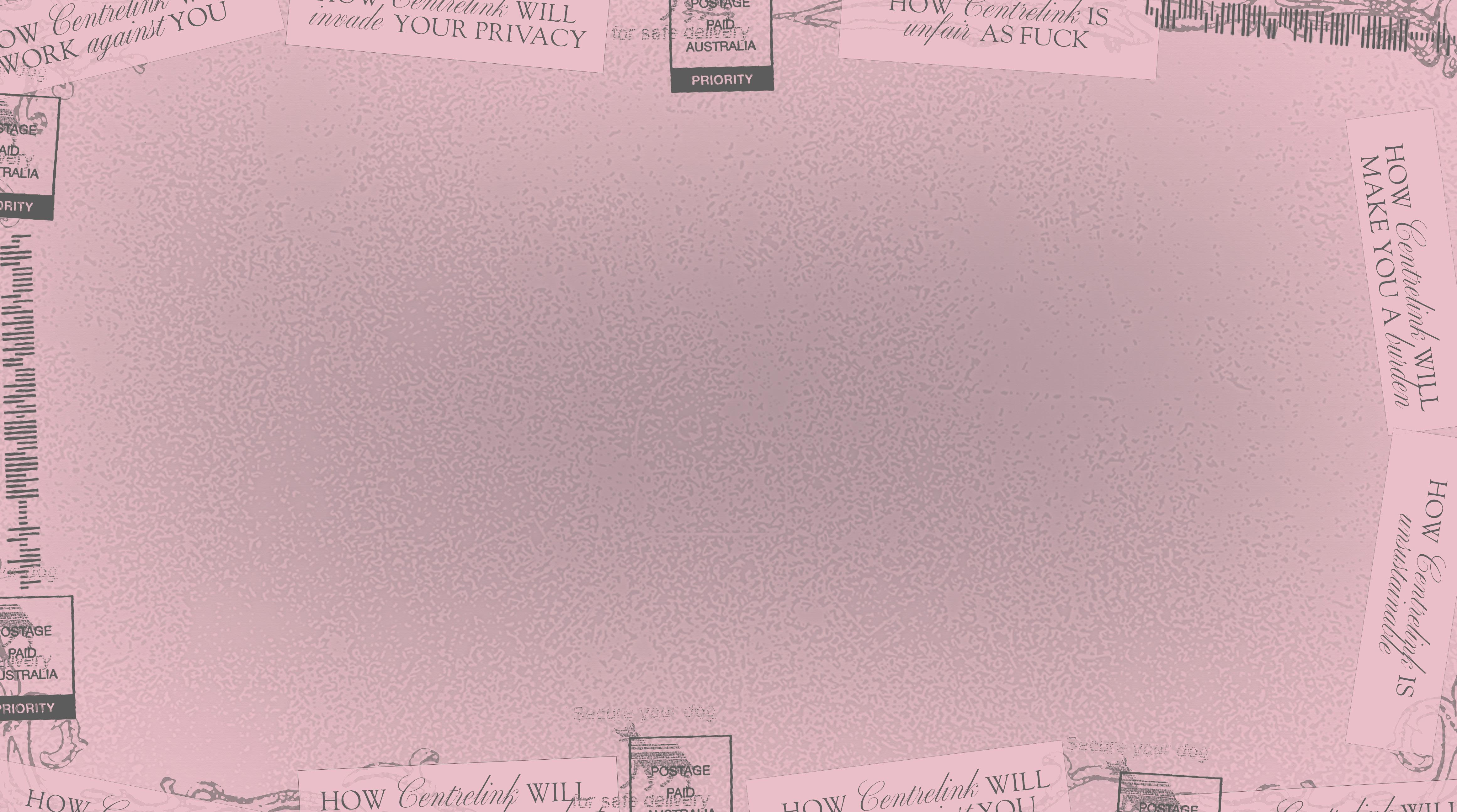
medication. Jemima slowly began to work away at completing the steps necessary for a successful application, all the while managing her delipitating symptoms.
“To be granted the DSP, you have to have a paper trail that proves you have tried everything available to cure yourself. You have to show that you’ve tried it and that it hasn’t worked.”
While preparing her DSP application, Jemima was living with her boyfriend and was using her JobSeeker payments to pay for the necessary medical appointments to support the application. Jemima noted that she underwent the following medical tests and treatments purely to satisfy Centrelink’s strict eligibility criteria and create a strong enough ‘paper trail’ for her application. Jemima noted that due to the cost of these appointments and her state of health, it took her two years to complete the following treatments:
- Cognitive behaviour therapy
- Formal diagnoses of her conditions from immunologists, GP and her psychiatrist
- Sleep studies
- 8 week graded exercise program
- Iron infusions
- Vitamin C infusions
- Numerous pain medication trials (which often inflamed other symptoms of her illness)
- Numerous sleeping medication trials
- Lymphatic draining
- Massage and acupuncture
- Light therapy
- Blood, stool and hair follicle tests
- X-rays
- Gene testing
After her formal application was submitted, Jemima had to sit through four face to face interviews with Centrelink/ mental health representatives, who at times would ask questions contradictory to her application in order to test the truth of her claims. Jemima recounts that she found the interviews incredibly challenging as she had to complete them whilst experiencing exhaustion, pain and brain fog, which was made worse by the stress of the process.
In her interview with Vertigo, Jemima cried across the table as she recounted that when her application for DSP was approved in 2021, she was able to move out into her own shared house, and was for the first time, completely financially independent.
“I cannot explain the feeling I felt when my application was approved. I was for the first time in my life, financially independent. I could finally choose where and how I wanted to spend my money.
That first year on DSP, I was able to buy all my friends and family Christmas presents with my own money. It was beautiful. But more than that, I felt seen. The biggest hurdle for those struggling with a chronic illness is that they feel like a burden on their loved ones and on society. For the first time, someone had acknowledged that my illness and the pain that it brought me was real, and allowed me to be independent from it.”
In 2022, Jemima decided to move in with her boyfriend. Continuing to live in her share house was no longer viable, as constantly having to climb up and down the stairs of the multi-level home caused her exhaustion, and the mould and cold temperature in the house were causing her health to deteriorate. Jemima


also noted that she longed for basic help around the house that she knew her boyfriend would be able to assist with.
She called Centrelink, and was advised by a representative that given the facts of her case, it was unlikely that Jemima and her partner would be deemed de-facto in the eyes of Centrelink, and that her payment shouldn’t be affected. In light of this, Jemima and her partner chose an apartment based on the rent accrued by their joint income and moved in, signing a 12-month lease. Jemima notified Centrelink about her changed living conditions as required, and her payments continued as normal.
After a couple of months, Jemima’s rental assistance suddenly stopped. Upon calling Centrelink, she was told it was because she hadn’t updated her living circumstances. She informed them that she had done this when she had moved. They then said she needed to fill a form for her partner about the nature of their relationship, which she did. The restrictive structure of this form, Jemima explained, meant that she was essentially forced to claim that herself and her partner were de-facto, despite having completely different assets and not owning anything in their home together besides their fridge.
In January of 2023, Jemima’s payment was changed from $1,200 per fortnight to $200 per fortnight, and she was told that her partner’s income would need to be lodged as her own. This left her once again financially dependent. Her new payment did not cover her share of the rent, nor did it give her much money to contribute to bills or food, let alone any of the medication or appointments she required to bear the physical and mental burden of her illness.
A few weeks later, Jemima was contacted by Centrelink, and told that she had an outstanding debt of roughly 15 thousand dollars. This was the amount she was overpaid by Centrelink between when she initially moved out with her boyfriend, and when her payment was reduced. She explained that she had no other source of income, and was unable to work due to her chronic illness, yet this was not taken into consideration. They also did not take into account the fact that Jemima had reported her changed living conditions correctly, and that the overpayment was an administrative error on their part.
Since the reduction of her payment, Jemima’s boyfriend works every single day of the week to support them entirely, and pays for their rent, their food and Jemima’s medication and appointments. Jemima is unsure how she will repay her Centrelink debt, and admits that she waits in extreme anxiety for the day her debt is formally handed to her from a debt collector.
Jemima and Charlie’s stories are just two of many injustices felt by Centrelink recipients. They are not the only ones who feel that crucial details and nuances of their situations have been overlooked, and that they have little means for help when fighting the hand that feeds them.
We know from Robodebt — a scheme introduced under the Morrison government which used a flawed income averaging algorithm to calculate debts owed by Centrelink recipients, only to falsely charge individuals with thousands of dollars of debts – that when welfare recipients are placed in situations such as debt, they are prone to serious mental health concerns and can display


suicidal tendencies.
The media and our politicians continuously work to make welfare recipients feel like burdens on their loved ones and on the state. Forcing someone into becoming their partner’s financial responsibility is a cruel way of amplifying that feeling.
Jemima and Charlie’s stories show clearly that the current way of evaluating individuals’ financial needs is unfair, unsuccessful and unsustainable. The neo-liberal rhetoric that ‘everyone should be financially responsible for themselves’ is not viable when you lack the resources to succeed that everyone else has. Such rhetoric is what causes people to fall through the cracks. We know this — That’s why Centrelink exists: to help our most vulnerable. Don’t forget that we are talking about our students, our single parents, our elderly and those suffering with disabilities here.
Centrelink exists because, as a society, we have chosen to preface equity over equality. But are we offering equity, if our system fails to protect an individual’s autonomy in all scenarios?
Australians, doesn’t everyone deserve the freedom to choose to live with their partner – to seek the security, support, and joy that cohabitation brings?
Our welfare recipients shouldn’t be punished for wanting what for most, would be a decision they wouldn’t be questioned for.

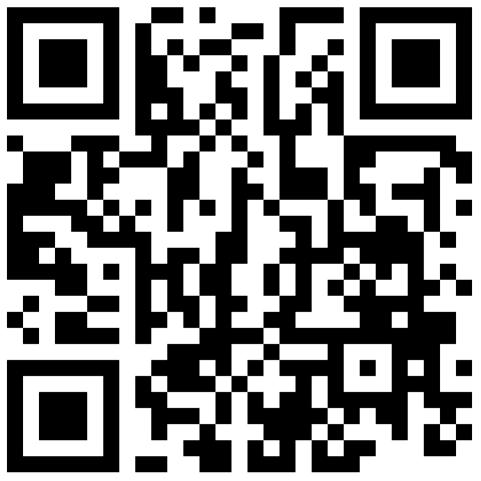




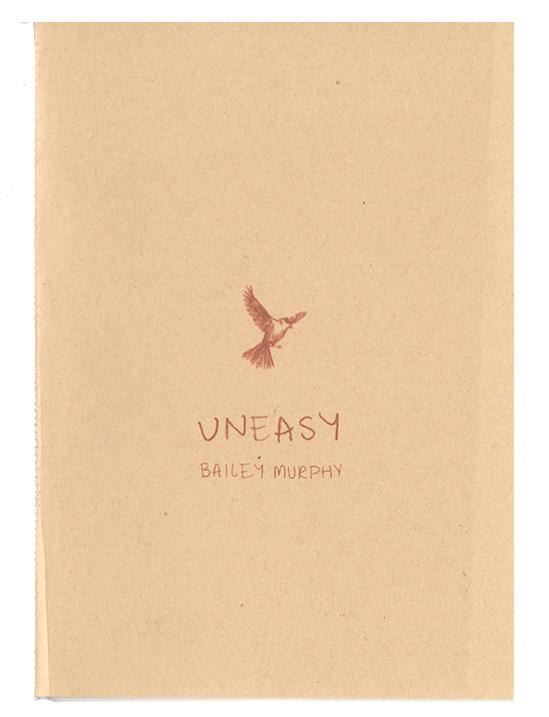


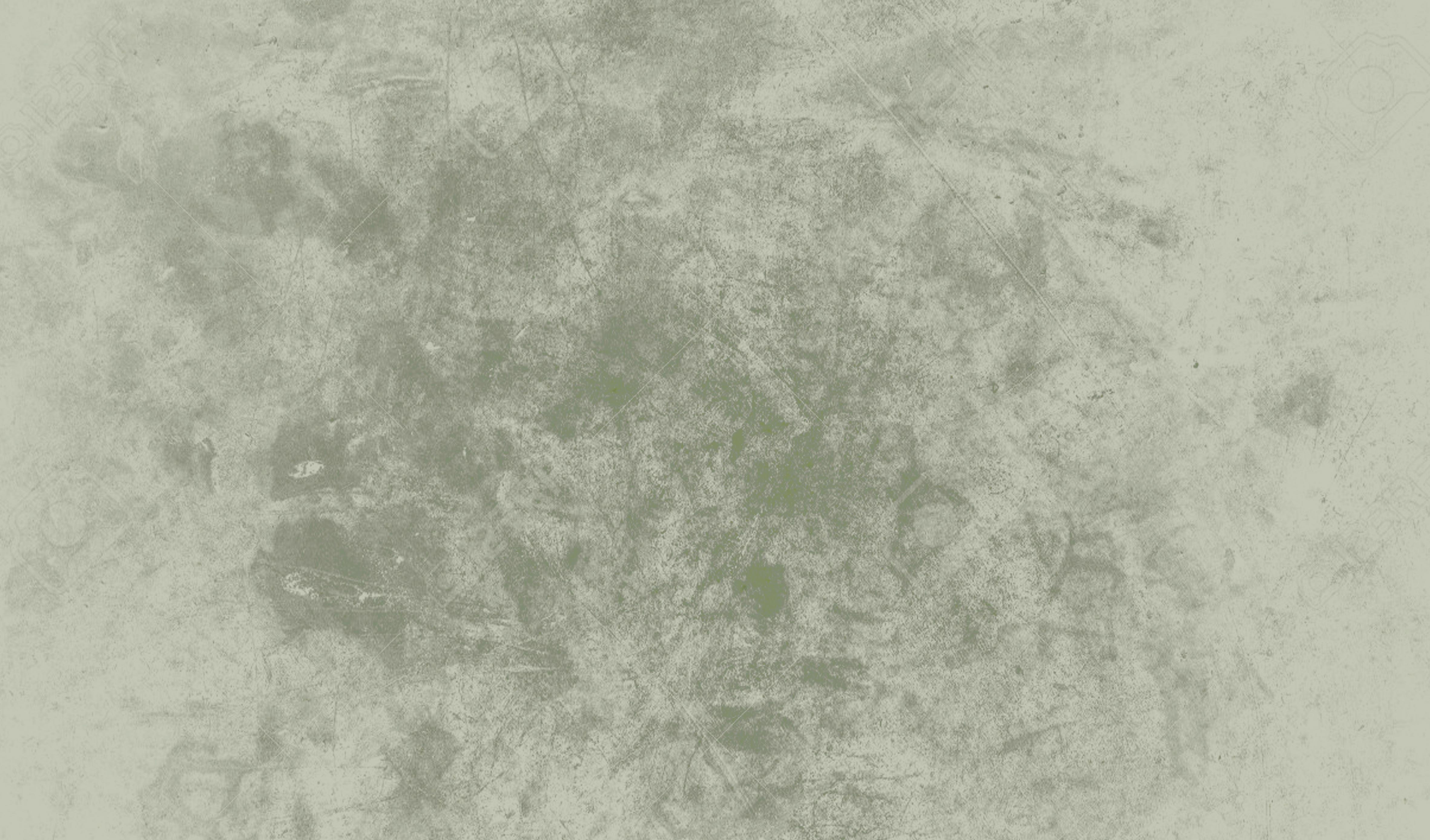
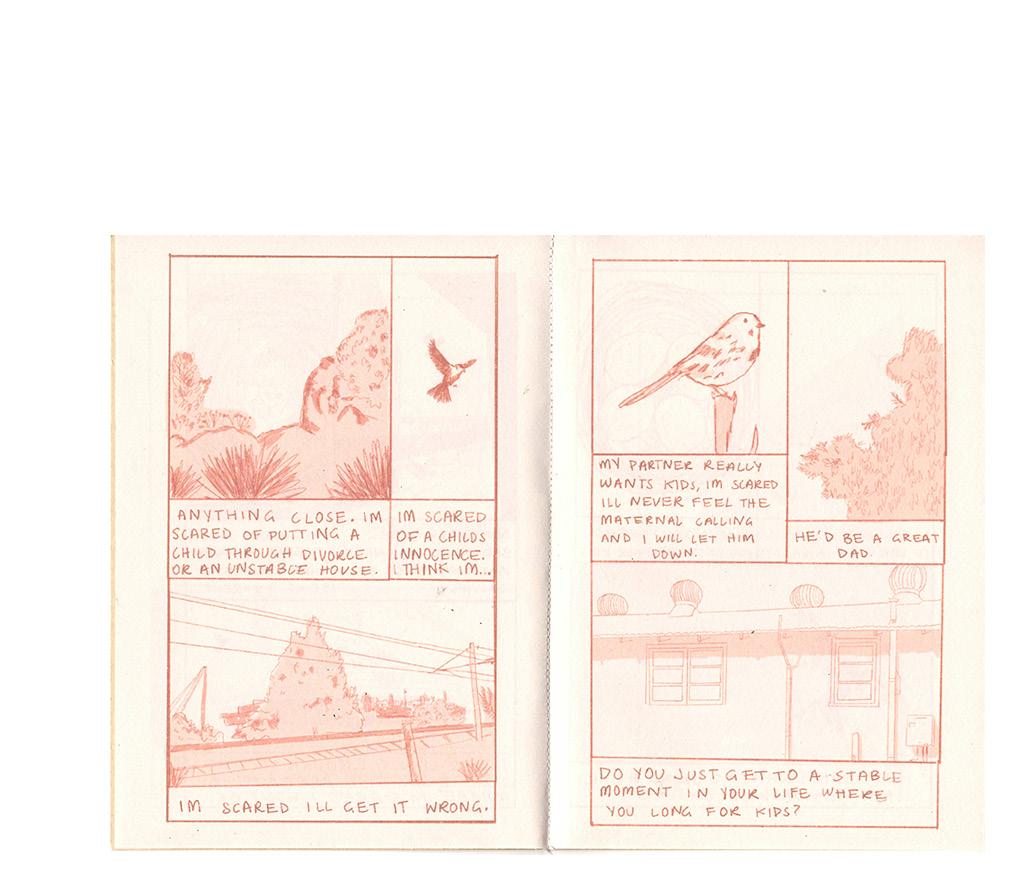
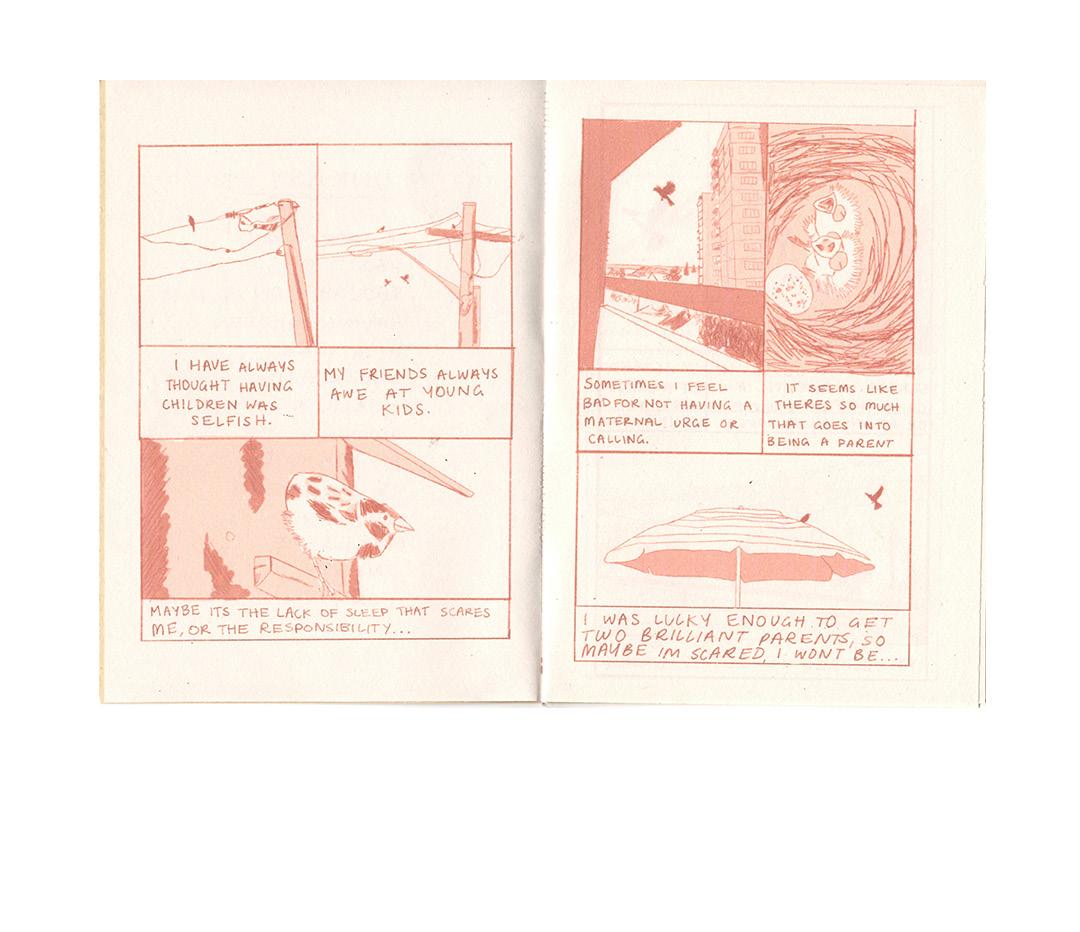


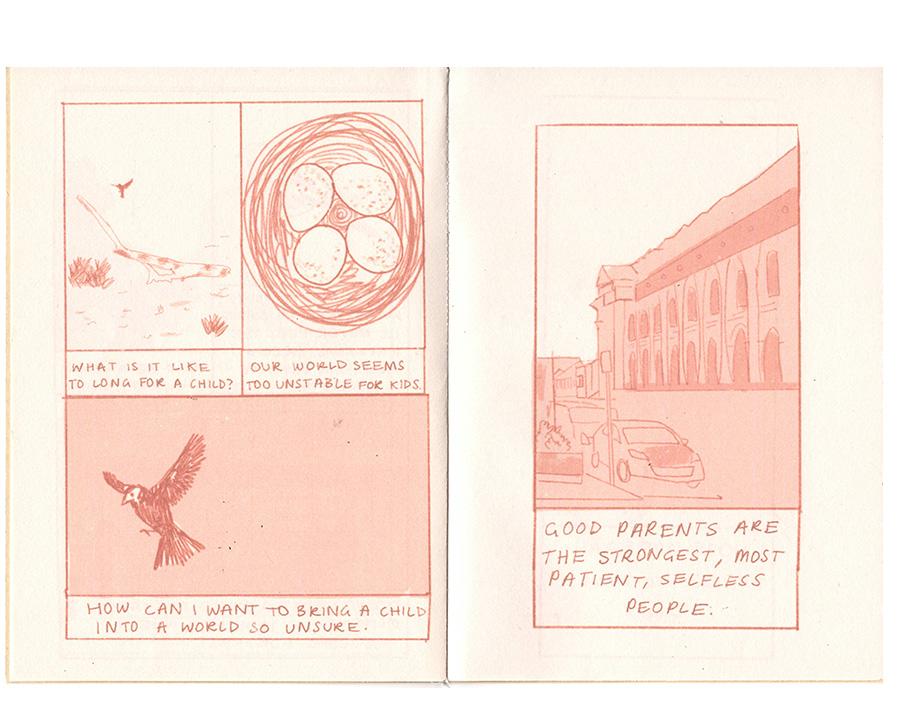




A short zine I made titled ‘UNEASY’ about my thoughts on children in a very uncertain world. Children and motherhood is a topic that arises frequently as I’m a young woman in a heterosexual relationship, and it makes me uneasy for now. I want those feelings of being maternal and wishing for kids but none of it appeals to me (for now, I guess).





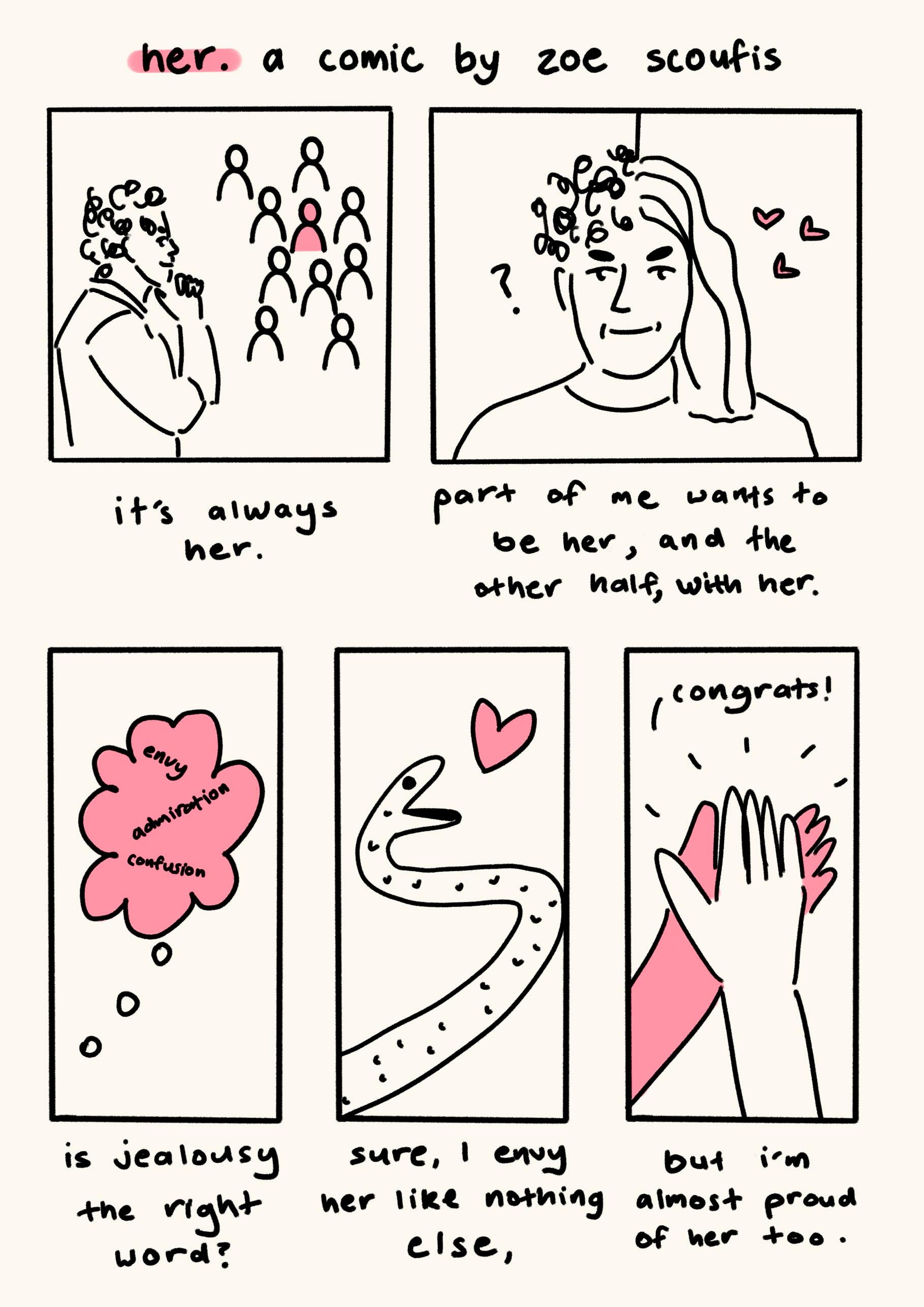
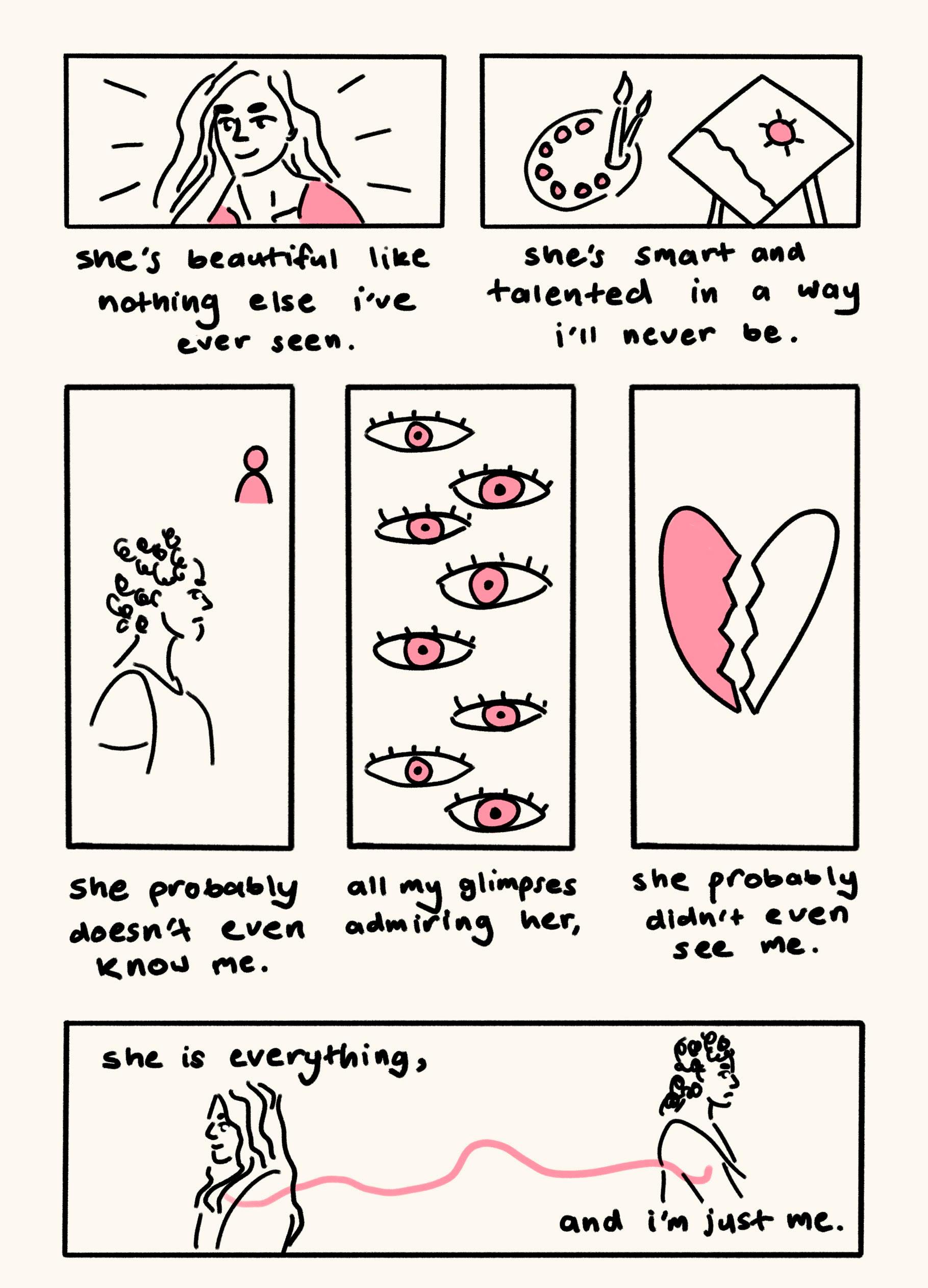
I have been working with ActivateUTS to get the HIV Self-Testing Vending Machine onto campus in early September. Ideally this will be in CB01.03a near the UTSSA office. The UTSSA will enter into the contract, and ActivateUTS will be managing the development of the graphics and design for the machine. The Faculty of Health is now also supporting this initiative.
The UTSSA has secured a few new spaces following the removal of the Queer Collective and Women’s Collective spaces from Building 3 due to building renovations. These include CB01.03.060 and CB01.03.23A-23E. Ideally over the summer holidays, we can begin to move into these spaces and re-develop/renovate them. This is explained further in one of the motions going up for consideration.
In my July meeting with Kylie Readman (DVCES), I provided Kylie with a letter drafted by UTS Staff for Palestine to the Vice-Chancellor in light of the recent findings of the International Court of Justice (ICJ) regarding Israel’s illegal policies and practices in the occupied Palestinian territory. Further, I was informed that UTS has agreed to enter into an MOU with the UTSSA on some of our demands elating to the ongoing campaign for Palestine. I provided Kylie Readman (DVCES) a list of demands similar to what has been agreed upon at other universities last month, and should be receiving a first draft of the university’s proposal in the next week. I expect the UTSSA will then negotiate with UTS Management to reach an agreement that suits the UTSSA’s positions on disclosure of research, partnerships and programs at UTS.
Myself and Alisa have been participating in the Academic Administration Working Group chaired by Kylie Readman over the last month. This group will ideally allow the UTSSA to push forward some of our key goals in standardising assessment policies across the university. Some other goals I have for this group are:
-Securing a simple extension process
-Mandating late penalties at 5% per day
-Standardised 11:59pm submission times
This month I’ve had two meetings with Anish and Jeremiah from Unitu, a UK tech company who have developed these two tools ‘Pulse’ and ‘Boards’ for student unions that have been rolled out in the UK. They’re doing a pilot program in Australia with 3 student unions and I’m interested in the UTSSA participating, because I think the tools can help increase student voice but also OB accountability. I will continue to keep everyone updated as my discussions with Unitu progress.
I have started an NUS Reform Working Group with a bunch of students from different unis following the NUS Education Conference. The goal of the group is to draft up a number of reforms to hopefully make the NUS better for student unions and safer for students. The group’s priority areas are, in order:
- Accessibility
- Governance Reform
- Communication with member unions
- Consequences/Enforcement mechanisms
- Leadership
- Improving NUS OB Roles
If anyone is interested in joining, let me know. I think NUS reform is a vital conversation to have before we discuss NUS re-affiliation later in the year.
As was my vision within the first half of my term as General Secretary this year, my main priority for activism and change will centre around incremental and tangible developments at a campus level. A significant priority, as it directly relates to my role, will be continuing to reform Vertigo prior to the induction of next year’s editorial team; as well as working with this year’s team in an attempt to steer the magazine in a quality and efficient direction. Other areas of focus in the coming months will include Palestine campaigning and activism against the University of Sydney’s Student Access Policy (C.A.P). Since the last time we convened myself, and half a dozen other UTS Students attended the National
Union of Student’s education conference at Curtin University in Perth. NUS conferences will always have a reputation for featuring intense debate between political groups; but it was positive to see minor adjustments aiming to make conference a better experience. For instance through a more properly enforced code of conduct, and respect for accessibility requirements taking into greater consideration by conference organisers and a majority of conference floor.
I would also like to issue a general reminder that all Office Bearers must send reports every council meeting. Upon familiarising myself with the nuances of the preexisting bylaws, I’ve come to realise that the rules currently state that reports need to be sent through 25 hours prior to a meeting (motions are also required 49 hours prior to meeting). This will give myself adequate time to include all reports in notices on time, so these deadlines will be the new standard, unless exceptions are made with due notice.
This month I attended the second meeting of the Academic Administration Working Group, a working group I am a part of alongside the UTSSA President Mia regarding changes to extension policies, special consideration, and attendance requirements for students. Automatic extensions have been a great interest of mine throughout my term and something I have been campaigning for, so I am glad to see that this working group is quite keen to implement this system and reform the university’s extension policy more generally.
A lot of my time was also preoccupied with preparation for my O’Day stall. At the time of writing this I am unsure of the results of the stall, however, I am hoping for a good response. My two main goals this O’Day are to engage with the student community to boost membership for the Education Action Group, as well as to get feedback from the current student community on what issues they may be having in their classes. My hopes for the next semester arew to firstly rebuild and broaden the EAG and get more engagement from students on educational issues. I am hoping to launch an EAG-led campaign in the next month addressing student poverty from educational fees: so watch this space for more updates! I’m looking forward to a productive and student-first spring session.
We are in full swing into our winter holiday break and during this time many students are fortunate enough to take a break from their studies and recoup their energy before the next spring semester begins. The welfare collective advocates for and understands the importance of taking time off to ensure that students mental health does not suffer as the stresses of university can take a toll on many students. During this time the welfare collective notes that students are still able to utilise the counselling services offered at UTS to aid the people during the break. All in all there is not much movement or events during this time with students at university rather it is crucial that people take this break to reflect and relax to ensure that they come back energised and ready for the next semester.
Past Events/ Initiatives Summary:
Throughout the month of July these events and initiatives were undertaken:
- Meetings/communication with the organisation Respect Now Always (RNA) to work on further collaborative events and campaigns. One of them being a Women’s Collective/RNA zine at the end of the year that would include physical copies and then also digital copies and social media assets. As well as the postponed feminist movie night in which we will be showing Legally Blonde.
- Planning a free period product marketing campaign that will be released in order to keep supplying UTS students in free period products in the bathroom.
- A giveaway online raffle with Dendy Cinemas for a feminist film premiere. Planning a collective meeting
Upcoming Events and Initiatives:
- Zine with RNA to be created by members of WOCO
- A feminist movie night in collaboration with RNA
- A period product campaign
- Re-locating the safe space
Tasks that the collective will be doing next month:
-A focus will be taken on the period product survey
-Relocating the safe space
-Planning more for the movie night
-Another giveaway
-Planning for the Zine
-Another collective meeting
1.
This month, a notable highlight was our participation in EdCon 2024 held in Perth. Representing the International Students Collective, In partnership with Deakin University to conduct a workshop focused on helping international students in their transition to Australia. The workshop covered essential topics such as cultural adjustment, academic expectations, and practical tips for living in Australia. This collaboration helped in providing valuable insights and resources for international students.
We had a productive meeting with the Pro Vice Chancellor (Student) to discuss the current progress and challenges faced by international students at UTS. This discussion was centred on identifying areas where the university management can provide more effective support.
The International Collective organized a roundtable meeting at the Consulate General of India, which was attended by various student representatives and consular officials. The meeting focused on critical issues such as the high-interest rates on student loans, the complexities surrounding the 485 visa, and the need for OPAL concession for public transport. Discussions also explored ways to provide financial support to international students facing economic hardships. The consulate showed a keen interest in these issues and assured us of their support in advocating for necessary policy changes at the federal level.
Another significant development was our meeting with Fair Work Australia. The discussion revolved around how student leaders at UTS can serve as primary resources for international students facing workplace issues. We reached an agreement to organise a workshop for student leaders, equipping them with the skills and knowledge to use tools like the pay calculator and understand workplace rights.
In an effort to foster a sense of community and ease the transition for new international students, the International Collective organized a trip to Manly. Nineteen international students participated in this event, which took place just before the start of the semester. The trip provided a relaxed setting for new students to meet their peers, ask questions, and get additional information with their start of studies at UTS. Activities included a tour of Manly, group discussions on adjusting to life in Australia, and Q&A sessions where experienced students shared their insights and tips. The trip was well-received and achieved its goal of creating a welcoming atmosphere for new international students.
July has been an active and impactful month for the International Students Office. From workshops and meetings to community-building activities, we have made significant strides in supporting the international student community at UTS. Our focus has been on providing practical resources, advocating for policy changes, and fostering a sense of belonging among international students. We look forward to continuing these efforts in the coming months, building on the foundations laid this month to further enhance the international student experience at UTS.
This past month especially after Education conference 2024 in Perth, I have been made aware of several issues that UTS has been going through that I feel needs to be addressed in the coming months.
Lack of support with UTS counselling services:
It has come to my attention that UTS has implemented a new rule where students are only offered up to 3-4 free counselling sessions throughout their whole journey here at UTS. This was not the case previously as we were able to have indefinite sessions to help support us through our degree and career journeys while studying at UTS. At Edcon 2024, we have had some constructive workshops on welfare of university students where other universities still implement free counselling services indefinitely, or at least up to 5-6 times per year. I feel this is where UTS is now lacking and I will be communicating with SRC on how to bring this to attention, as counselling services and the ability to get special consideration documentation and support in general is very important and integral to the well-being and journey of students.
Accessibility of mature age student entry at UTS:
It has come to my attention that mature aged student entry is not very accessible here at UTS. I have had people come to me for advice on enrolments and admissions, with very disappointing news that ATAR/HSC results are still the main entry scheme for UTS, and including UTS college for people 21+. I feel that this is very damaging to passionate people wanting to start their careers later on in life, and I will be trying my best to discuss and explore ways to mitigate this issue to ensure equity and fairness in giving opportunities to new students.
Whatsapp group for postgraduate students: Inspired by our amazing international students officer Raghav, I will be trying out creating a whatsapp group for postgraduate students to give them a platform to express their concerns and creating a close knit group more informally. MS teams is a great platform, but can be seen a bit too formal for some people so I will give whatsapp a chance.
Past Progress Summary:
- Ethnocultural safe space is now ready for ethnic students to use as a safe space to disclose any discrimination issues.
- This includes BIPOC individuals in the UTSSA as a safe space to work on reports, events, etc.
- I was invited to speak alongside the Racial Discrimination officer at a panel on cultivating an anti-racist campus culture on August 12th. The organisers have been acting in a manner that seems to be against having a PalestinanAustralian speak at this event, but they ended up putting me on the panel after the president of the UTSSA emailed them about why I was essentially ignored at the time of organising this panel. They have since put me on but are yet to fully update their ticketing website to include me in the event description. It is a very interesting development.
Current Progress:
- Furnish the Ethnocultural room.
- Encourage students to email me for meeting dates and further information regarding reporting any issues with racism.
- Continue to foster an inclusive campus culture and provide a platform for all ethnic students to share their experiences and concerns.
Future Plans:
- I will organise a meeting with Dr. Elaine Laforteza to discuss how to proceed with this semester’s racism reporting.
- We will collaborate with UTS Palsoc on a Palestinian games night on August 15th. This Night will include a trivia night and a night when many different ethnic groups will come together to celebrate Palestinian culture.
- Other than the above, the collective has been quiet over the holidays.
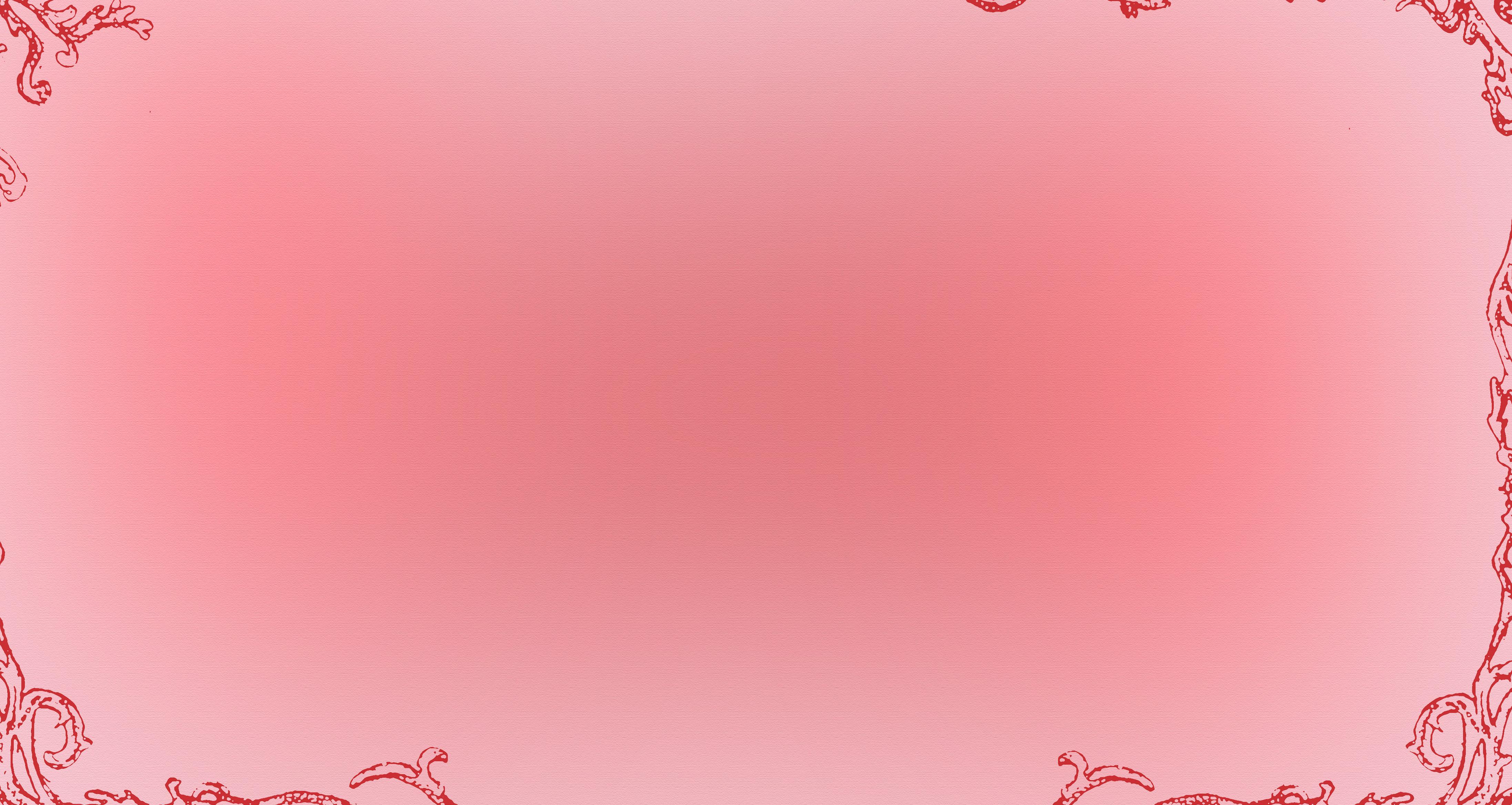
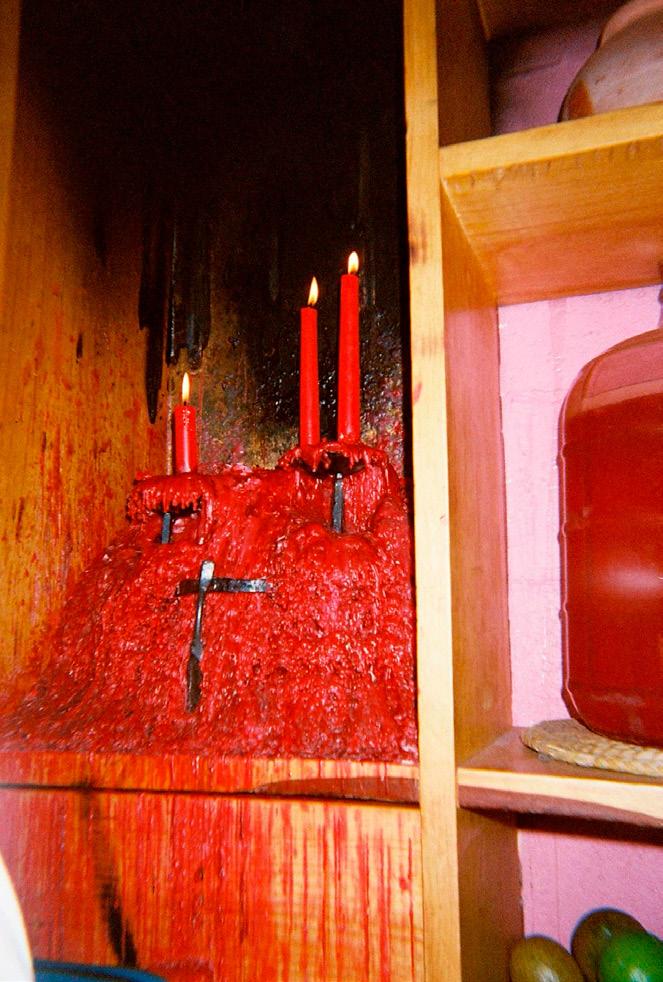

We are constantly publishing articles for you guys. Head to our Instagram (@utsvertigo) and our website utsvertigo.com.au for daily updates and new articles each week.
Want to be part of our next printed edition of Vertigo, or have your article posted on our website?
Vertigo relies on the submissions sent to us by our readers, and we take your submissions all year round. We love reading whatever it is you’re willing to share, whether it be your article, your creative writing piece, your design, your fashion, your art... whatever it is, we want to see it!
Vertigo knows no limits.
- Student News
- Politics + Law
- Arts + Lifestyle
- Society+ Culture
- Showcase pieces (photography, fashion + more)
Send us an email and get involved!

Our submissions email is submissions@utsvertigo.com. au and one of our editors will be in touch with you.
Follow us on Instagram (@utsvertigo) to stay in the loop. Our Instagram is where you will see our callouts for a chance to be featured in Volume IV.
